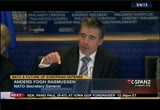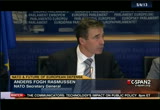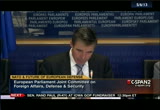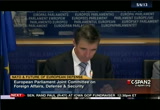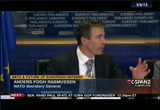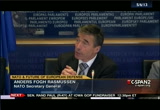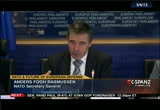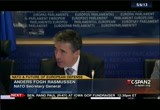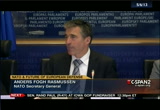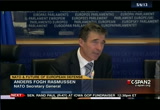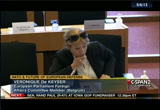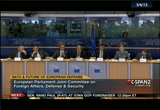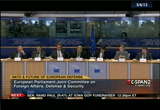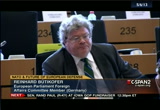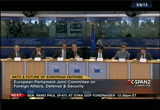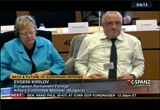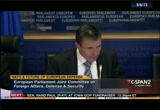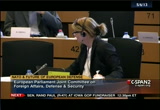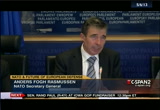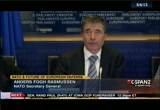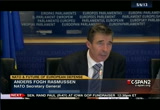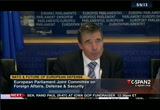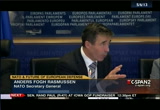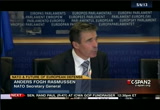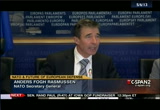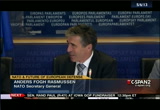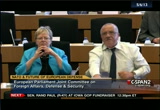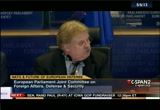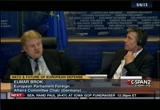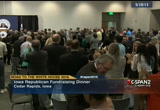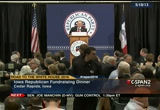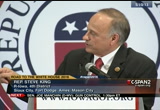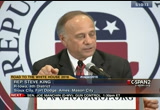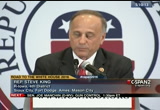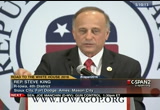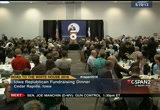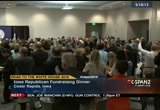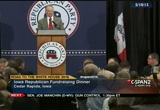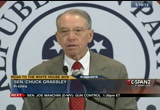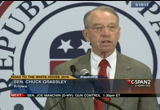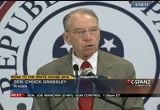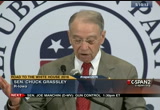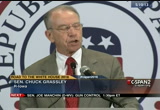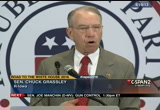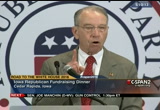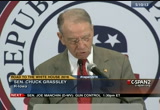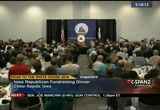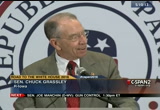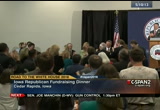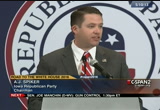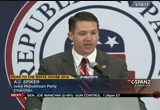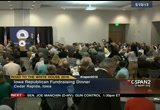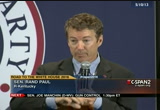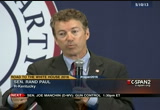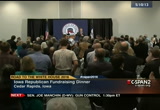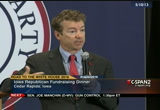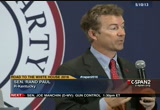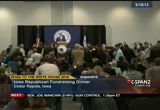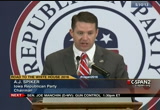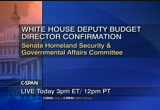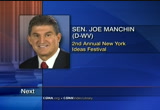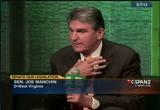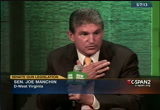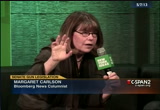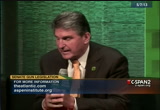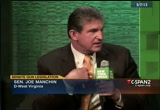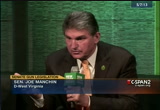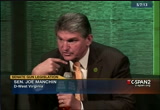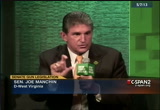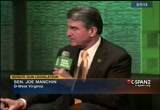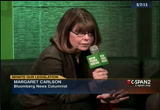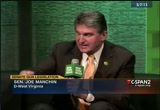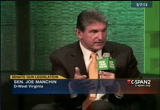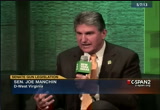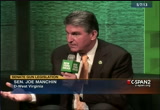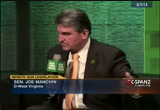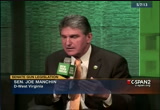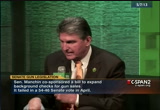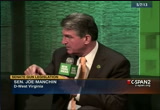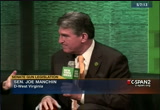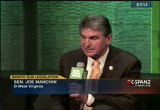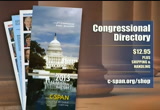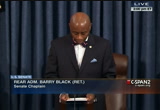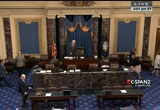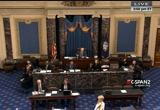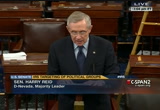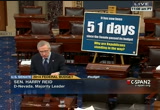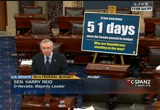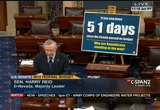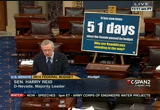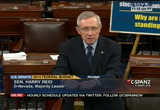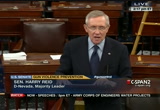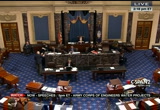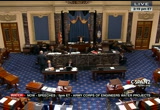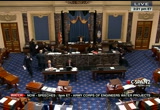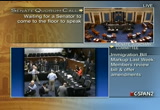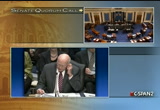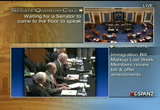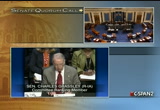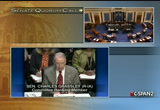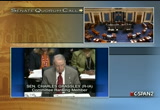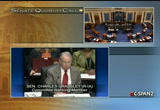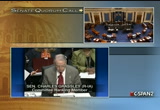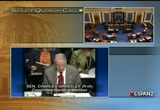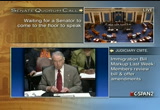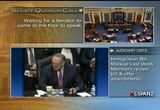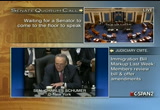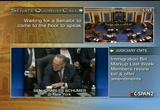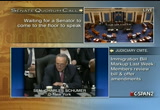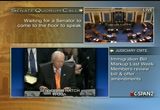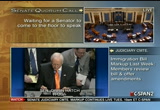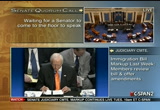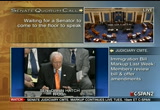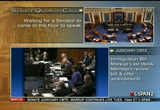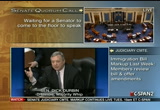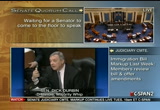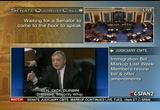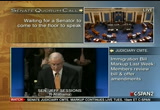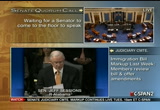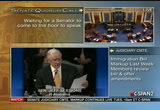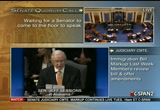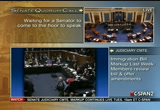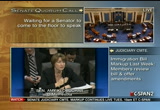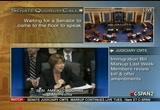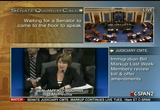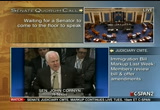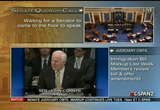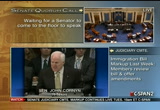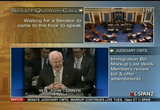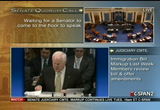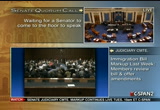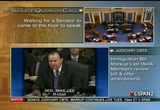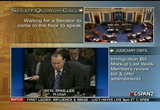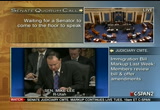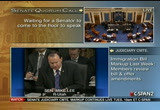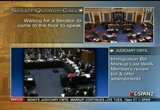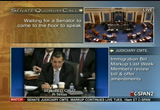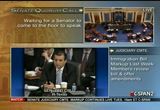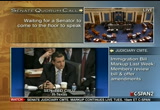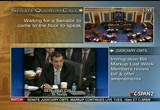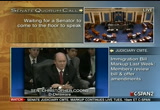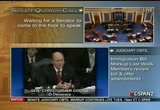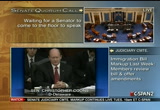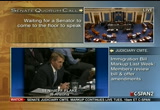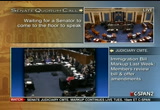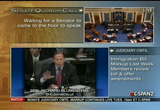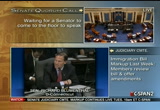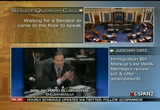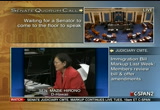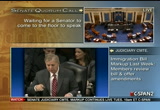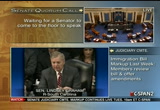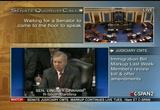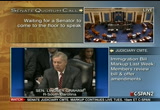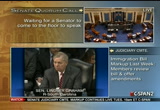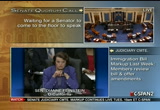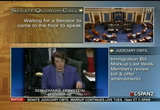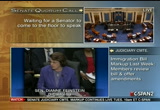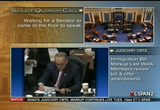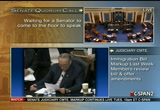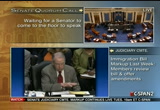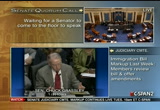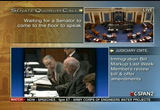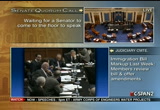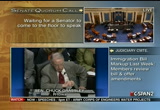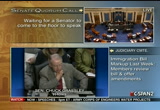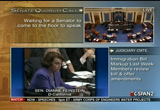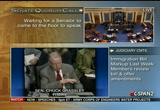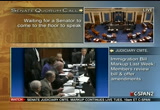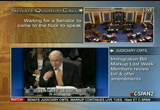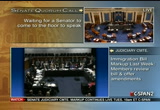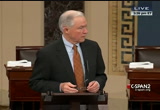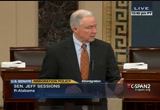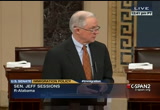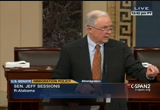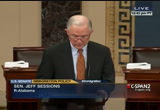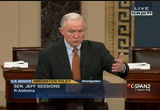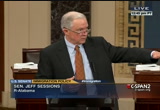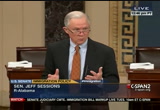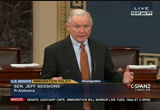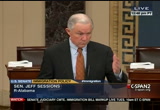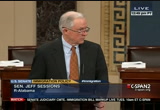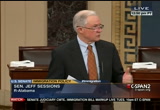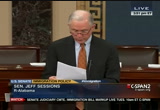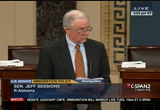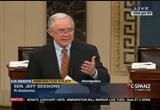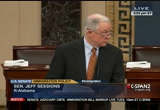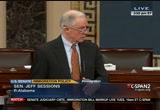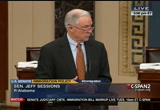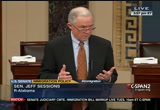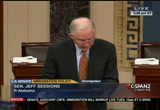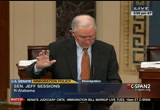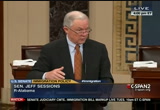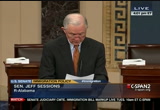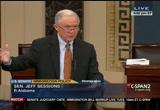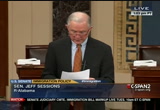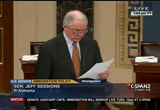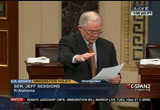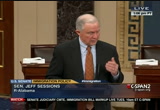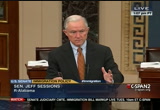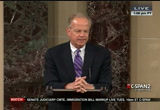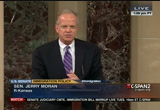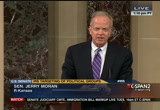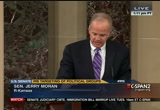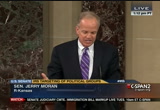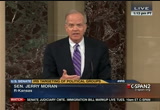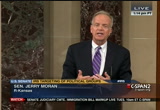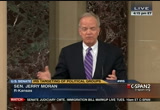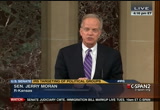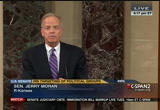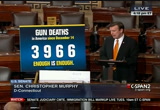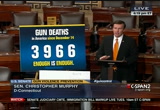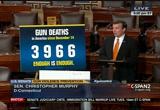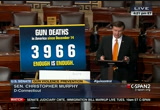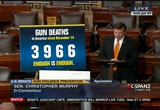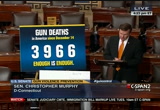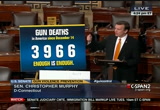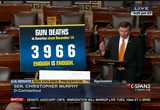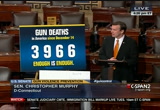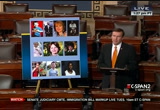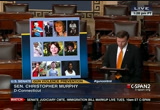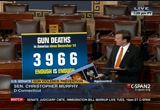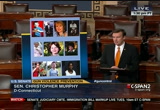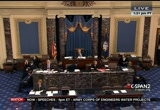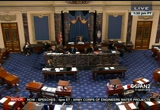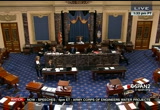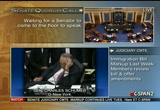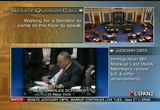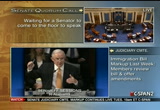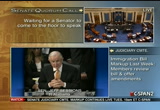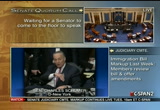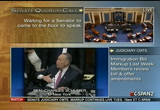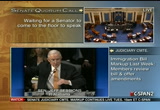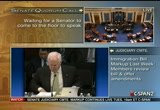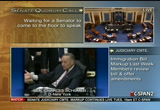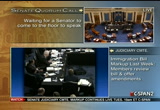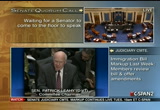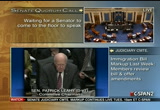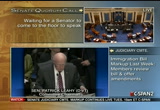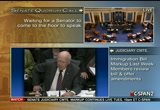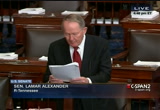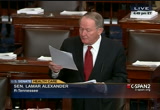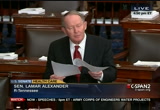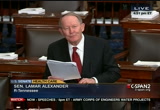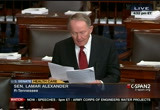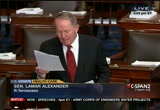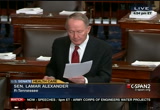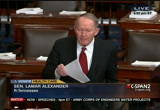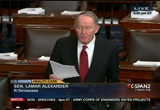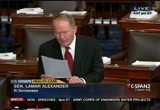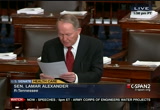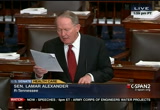tv U.S. Senate CSPAN May 13, 2013 12:00pm-5:01pm EDT
12:00 pm
i care about the work to be done. now, this is why i do agree that the most important thing to decide at the european council meeting in december would be to invest a sufficient amount of money in critically-needed military capacities. that would be the most important decision to take at all. now, mrs. cronberg asked me whether nato envisages a role in iran. no. and i've never, never made such a statement. on the contrary, i've said that nato as an alliance is not engaged in the iran question.
12:01 pm
we support international efforts to find a political and diplomatic solution. now, on missile defense you asked me whether the change of the so-called phased adapt cannive approach -- adaptive approach could also facilitate closer cooperation with russia on missile defense. and that's an important question. my answer would be, yes, i think it should. because the russian concerns so far have primarily been related to the fourth phase. and now phase four as actually been abolished. and so if there is a political will in moscow to actually cooperate, i think that could pave the way for an agreement as
12:02 pm
to how nato and russia could cooperate on missile defense. let me stress, having said that, the fact that phase four, the fourth and final phase has been abolished does not change that the whole of the population in european nato nations will be covered by the nato missile defense system because the first three phases will be imelemented as planned, and that will -- implemented as planned, and that will cover all populations in european nato nations. i was asked when will the occupation of kosovo.com an end.
12:03 pm
kosovo come to an end? well, the interesting thing is that people in the region don't consider it an occupation. on the contrary, recently when kathy ashton concluded the agreement between belgrade and -- [inaudible] both parties requested nato to stay and guarantee peace and stability and help implementing the agreement. so, i mean, that's not an occupation. and, of course, i am pleased to see that they toe is considered such -- nato is considered such an impartial guarantor of peace and stability. and, of course, we will stay as long as necessary to implement the u.n. mandate. we operate on the basis of a u.n. mandate. we have an obligation to implement the u.n. pan kate to insure -- mandate to insure free
12:04 pm
movement -- [inaudible conversations] [laughter] >> you asked me about afghanistan. there is a clear road map. by the end of 2014, the isaf mission will come to an end. that will complete our combat mission. but we will stay after 2014 with a noncombat be mission, a training mission to help the afghan security forces. mr. lisek asked me when we do anything to stop cuts in defense budgets. as you know, international decision. they toe as an alliance can't interfere with that. that's a national decision. we have a men be. mark according to which -- a benchmark according to which nato allies have stated that those allies that spent more than 2%, on defense
12:05 pm
commit themselves to stay above the 2% while those allies below 2% will try to work towards 2% benchmark. it's not a legal requirement, it's a political obligation. and whenever i visit capitals -- and soon i will visit warsaw -- i will repeat that message. and, actually, i can tell you that i have had political, a political dialogue with government, but also with parliamentarians in some capitals. and i, i have seen a positive response. i can mention one country in which the main political parties have reached broad political agreement according to which they will now move gradually towards 2%. so that's why, actually, for our
12:06 pm
nato secretary general it's also important to engage directly with parliamentarians. because this is very much about budgets, defense budgets and financial and fiscal policy in general, of course. now, you also asked me, mr. lisek, about missile defense, how can we convince people that it's also in europeans' interest in it's quite clear that we are faced with a real missile threat. more than 30 countries in the world have missile technologies or are acquiring such missile technologies. some with a range to that they can kit targets in europe. -- they can hit targets in europe. so it is clearly in europe's interest to develop an effective protection against that real missile threat. finally on georgia, the decision
12:07 pm
we took in bucharest in 2008 at the nato summit still stands. we stated georgia will become a pen of nato -- a member of nato. of course, provided they pull fill the necessary criteria. we have established a special nato georgia commission, and within that commission we work with georgia to move forward so that georgia continues her reform process with the aim to one day in the future be able to join the alliance. we're not there yet. we -- there is a lot of work ahead. but i am pleased that the new government in georgia has reaffirmed its nato aspirations. so it's very much for georgia to demonstrate that georgia fulfills the necessary criteria. finally, mr. vogel asked me
12:08 pm
about future enlargements. we have engaged actively with -- [inaudible] as you know, we have made a decision also in 2008 in bucharest that we are ready to start accession negotiations as soon as a mutually-satisfaction solution to the name issue has been found. they know that. so i think from a they toe perspective we have -- from a nato perspective we have done all we can. we are ready to start accession negotiations immediately when a solution to the name issue has been found. so i encourage all parties involved to do their utmost to find a solution to that name issue. to my mind, it's not impossible. it's within reach if there is good political will. thank youment.
12:09 pm
>> thank you very much. i had originally four names on my list -- three names for the last round, now we have six. it's hardlitydiminished, but if everyone keeps his part for one minute, perhaps we can make it. ve -- veronique, you are the first one to try that. [speaking french] >> translator: thank you, chairman. i've just one question for you, mr. rasmussen. were you in nato conversant with the bombingsing carried out by israel on damascus? did you coordinate that operation? the reason i'm putting this question to you is that on the 7th of march, 2013, nato signed a partnership and cooperation agreement with israel, a
12:10 pm
bilateral agreement, and there were headlines in the press at the time to the effect that israel was becoming a de facto member of nato. the idea was to strengthen the process of military planning between israel for the purposes of any future actions in the middle east. that was just two months before the current operations, and it's hard to believe that there's been no coordination. if, so how do you analyze their actions in thank you. >> [inaudible] >> thank you, president, mr. secretary general. you've talked about the need for leadership in a changing world, the need for capacity, of course, without and which political leadership is quite empty. i wanted to ask you about the capacity in the so-called cyber domain or in relation to technology and defense. in the united states, it's been
12:11 pm
established that offensive capacity is legitimized and is necessary. i've read with great interest the that'll lin tallinn manual. could you tell me how you will secure that freedom and security also in relation to technology do not become a zero sum game. the last question related to syria where i think hard power is, unfortunately, one of the few options, i've followed the dossier closely for the past years. and on a number of occasions, even without being prompted, you mentioned that nato would not get involved in syria. i simply wanted to ask you why. >> mr.-- [inaudible] thank you, chairman. i just came back from the balkans, and talking about balkans, we still have some unfinished business there as far
12:12 pm
as the nato enlargement is concerned. macedonia was mentioned, but what about countries such as montenegro, or how do you see bosnia herzegovina, how do you see the prospects of syria? do we expect the next nato summit will be an enlargement one? enlargement summit? thank you. >> mr.-- [inaudible] >> thank you, secretary general. three questions. what should nato, in your opinion, do to promote nuclear disarmament. second, there's an arms race, an incipient arms race going on in east asia, and we are feeding into that with our arms exports. what's your opinion on that? shouldn't we be more cautious in our policy regarding arms export
12:13 pm
to that region in and, third, beyond missile defense what is, according to your opinion, the top of the agenda that we should pursue as europeans and particularly i u.s./nato with regard to security cooperation with russia? and in this context i'm sure you've seen the report by four elder statesmen -- you know the names -- on building mutual security in the euro-public region? what's your opinion on that? thank you. >> thank you. mr.-- [inaudible] >> yes. as you know, there last year ths this -- [inaudible] terrorist activity on a large scale on a european territory, and following that, of course,
12:14 pm
following a lot of coordinated investigations and so on, there's still an impasse. the united states and israel believe that it's hezbollah x they even press the allies to deal with hezbollah in an official manner. on the other hand, there's still some controversy here. of course, this is not the core of your activities, but this must have been discussed. we see connection, of course, with hezbollah and the last strike. is it possibly related with the fact that if something serious has to be undertaken in the future -- i hope not regarding iran -- hezbollah probably has to be dealt with before? >> [inaudible] [speaking in native tongue]
12:15 pm
>> transr: well, a number of countries felt affected by mali. what about nato? you will be aware, secretary general, that a number of russian planes came close to the swedish frontier. might that have happened had we been a member of nato -- [inaudible] >> um, thank you very much. first, to mrs. kaiser asked me whether nato and israel had or
12:16 pm
have coordinated strikes. no, definitely not. we have a partnership with israel, yes. we have a partnership called the mediterranean with tie log which -- dialogue which actually counts not only israel, but six other countries in north africa and the build -- the middle east. and we have developed international coordination programs with each of these countries. but we, we haven't coordinated in strike. mrs.-- [inaudible] cybersecurity, that's absolutely one of the new security challenges on which we need to focus much, much more in the
12:17 pm
coming years. we're in the process in nato of strengthening cyber, our cyber defens first step has been to strengthen the defense of our own nato networks, and we need that because on a regular basis we are attacked which shouldn't be a surprise. so far we have been very successful in defending our systems. so that's the first step. next, of course, we will also have to consider whether and, if so, how we can develop a capacity hack come to -- that can come to the help of individual allies that are subject to attacks. some allies may have the capacity to defend themselves
12:18 pm
against such cyber attacks. other allies would appreciate to have a nato capability, a kind of a rapid reaction team that can assist upon request if needed. so these are some of the elements in the work that is, that has been prepared. and, obviously, cybersecurity is also an issue with which, on which we need strong cooperation with partners, partners across the globe. because cybersecurity is a cross-border issue and should be dealt with in, also if partnerships with like-minded countries. now, you asked me about syria. why is it that nato doesn't have
12:19 pm
any intention to intervene militarily in syria? and, actually, very often i get that question because people refer to the very successful nato operation in libya, and then they ask me why couldn't you do the same in syria? but i have to say there is a very clear difference between libya and syria. in libya we operated on the basis of a clear united nations mandate to protect the civilian population against attack. and we got active support from countries in the region. none of these conditions are fulfilled in syria. syria is a much more complex society, and i do believe that
12:20 pm
an external military intervention might have unpredictable regional repercussions. this is the reason why i do believe that the right way forward is a political solution. having said that, i fully share your frustration. it's absolutely outrageous what we're witnessing in syria. and this is the reason why it is, indeed, a matter of urgency that the international community sends a strong and unified message to the regime in damascus. so far the u.n. security council has failed to reach a consensus. i strongly regret that. the more because i do believe that we have a political framework that could be used. as you will recall, in june 2012 the so-called action group on syria issued a statement, a
12:21 pm
declaration signed by all five permanent members of the u.n. security council. in that statement it's clearly stated that the regime in damascus should initiate a process, a transition leading to a combination of legitimate aspirations of the syrian people. i do believe that a political solution could be based on that declaration. but to that end, of course, we need a u.n. security council resolution. now, mr.-- [inaudible] asked me about the perspectives for the balkans. montenegro has made substantial
12:22 pm
progress. this is the reason why we have granted what we call a membership action plan to montenegro. they do not fulfill the necessary criteria at this stage, but i'm quite 'em -- impressed by the work done and the progress achieved in montenegro. bosnia herzegovina. there's a political stalemate. a couple of years ago we grant canned what i would call a condition-based membership action plan to bosnia hefs governor any ya. we have declared that we are willing to activate that membership action plan as soon as the bosnians carry through certain reforms, modest reforms, actually, related to defense property. i went to bosnia in february year. i had a meeting with the political leaders. they promised me to implement a political agreement they reached
12:23 pm
last year. but so far we have not seen any progress. it's really regrettable. but we stand ready to move forward as soon as they do their homework. and i have already answered as far as -- [inaudible] concerned. and i do believe the recent political agreement between belgrade also facilitates progress as regards western balkan integration in the euro-atlantic structures. so it's very much up to the countries in the region to do their homework. then we stand ready. this brief, we are ready when -- in brief, we are ready when they are ready. so whether the next summit will be an enlargement summit, i mean, first point, we have not made any decision when we will have the next summit. secondly, to become a member of nato, you need to fulfill certain criteria.
12:24 pm
so it's for the applicant countries to do their homework. on nuclear disarmament, i mean, we have adopted a strategic concept. in that strategic concept, nato's strategic concept, inthat reaffirm what most nations in the world subscribe to already in 1970 to work towards a world without nuclear weapons. we share that grand vision. however, we are not naive. so we also stated that as long as nuclear weapons exist, they toe will remain a nuclear -- nato will remain a nuclear alliance. but having said that, we would be pleased to see a reduction in the stockpiles of tactical nuclear weapons in a balanced way. and here i have to tell you that
12:25 pm
nato allies have reduced the number of nuclear weapons substantially since the end of the cold war. the same is not the case when we are speaking about russia. so that's why i have to stress that, yes, we are, indeed, in favor of reducing the number of nuclear weapons, but in a balanced way. and on euro-atlantic security, i have read the report from the group with great interest. and definitely we need a positive engagement with russia. that's also why we have invited russia to cooperation on missile defense. we have moved forward with russia on a lot of practical cooperation areas.
12:26 pm
but cooperation on missile defense would be a real game changer. so far our invitation has not been positively received in moscow, which i regret. but we continue our, we continue our dialogue. be -- now, i was asked whether this incident would have taken place if sweden had been a member of nato. i don't know. i don't know. and i'm not going to interfere with the domestic swedish debate on nato. i have followed it with great interest, but i have to reiterate what i have also clearly stated on swedish soil,
12:27 pm
that there is a clear difference between being a member and not being a member, to be covered by article v you have to be a member of nato. but we appreciate the very close and very positive partnership we have with sweden. [inaudible conversations] [speaking german] >> translator: thank you very much, secretary general. [applause] [speaking german] >> translator: thank you, secretary general, for your remarks and explanations. >> the next speaker is here. [speaking german] >> translator: i'd like to thank the secretary general for attending, and i think that
12:28 pm
between now and the e.u. summit there will be and should be discussion between the e.u. and nato given the synergy effects which can only be achieved through european cooperation. but also for reasons of the clear lines of complimentary cooperation between nato and the european union. [speaking german] >> translator: perhaps all of you at the back could remain seated until we've closed this item. >> [speaking german] >> translator: and we'll see that this is all the more necessary given the possible changes in u.s. policy. i don't know what u.s./middle eastern policy is going to be.
12:29 pm
if the usa becomes self-sufficient in energy, that will change the balance of interests between the u.s. and europe and, therefore, also between nato and the european union. that's very important for the two communities in this city to continue to cooperate. i'm very grateful to you for the opportunity to debate today. but sometimes in this nato/e.u. discussion we have to recall that in foreign policy the e.u. plays a phenomenal role in terms of its nonmilitary assistance. nonmilitary preventive assistance is provided for to a large proportion by the european
12:30 pm
union. 60% of foreign aid comes from the european union. so when we talk about burden sharing, if we want to talk about being fair, we have to take those numbers into account. i do hope that this cooperation will flourish, and i do hope the europeans will take their military responsibilities more seriously. ..
12:31 pm
>> first generation product. works similar to a breathalyzer. in order to start the vehicle the phone has to be literally docked and locked in our system in order to start the car. >> what we have here is campaign to draw education against the dangers of texting and driving. we created this online simulator that we actually bring to high schools and events across the country. we're trying to bring the message home in very safe environment how difficult it is to text and drive. >> see technology that helps shape public policy we'll
12:32 pm
visit cea technology fair on capitol hill tonight on "the communicators" tonight on c-span 2. former south dark u.s. representative stephanie his seth will not seek the seat vacated by retiring senator tim johnson. she want to focus on her job and. only announced candidates for johnson's seat former governor mike brown and rick weyland, a former staff for senator tom daschle. one. earlier presidential race candidates is the kentucky senator rand paul. he spoke to people at the iowa gop lincoln dinner in cedar rapids. he says he is considering a run but a decision will not come before 2014. senator chuck grassley, representative steve king, they also delivered remarks. this is about an hour.
12:33 pm
[applause] >> on behalf of the republican party of iowa i want to thank all of you for coming out tonight. it means a lot to me. it means a lot to the party. and when we look at a crowd like this in eastern iowa i can tell you that the first congressional district is in play in 2014 and we will be prepared to fight in it. the second congressional district is in play. we're recruiting hard for that seat and we plan to compete and win there also. you can clap. [applause] but we've got a wonderful opportunity ahead of us as republicans. i can tell you when we as a party stand on principle we win and time and time again when we have stood, if you look back at 2010, when we
12:34 pm
swept across the nation with a tea party tidal wave of wins in the republican category it was because we as republicans stood on principle. i'm confident that a republican party that stands on principle, that is consistent, that stands for the sanctity of human life, that stands up for marriage, that defends the second amendment, is going to be a republican party that will win, that energize the base and that, that will advance the principles that we all are fighting for. [applause] at this time, i would like to introduce tonight's first speaker, congressman king. king served in the iowa senate before being elected to the united states congress in 2002. congressman king is a husband, and a father of three, which is absolutely
12:35 pm
the most important thing he can be. and we all know him here in iowa as the nation's strongest advocate to end obamacare. [applause] please, please join me in welcoming my congressman, steve king. [applause] >> wow!. thank you all very much. that is, that is a really, really nice welcome. [applause] thank you so much. hey, matt. i'm tell you this is a room full of republican luminaries and it is like a great big family reunion for me. old friends, n people to become friends and
12:36 pm
people that are bonded together here to move this country and this state in the right direction. and one of the directions that we have for us is this. the process of selecting the next leader of the free world begins in iowa and it is already begun. [applause] the and we as individuals in this state have more to say about who will be the next president on a per capita basis than anybody else in the country, insight of what they might think among my friends in the granite state. and we have great friend there and we need to be bonded together there to make sure iowa stays the first in the nation caucus state and new hampshire stays the first-in-the-nation primary state. that has got to be our bond. [applause] and if we don't do that, whoever is the richest, whoever has the deepest pockets, whoever can hire
12:37 pm
the best media people, can create a persona for the nation that would can cause them to go on the next president and common person could never again be a president of the united states. while i'm here saying this the person who i think has done the most for the first in the nation caucus because he went to all 99 counties. did something like 384 meetings around this state, rick santorum did a great job to preserve the first-in-the-nation caucus here in iowa. [applause] that's what we want. we get to know these candidates face it face, one-on-one if we can. now what's in front of us? first of all, when a.j. talked about the repeal of obamacare, you remember when that passed? i remember when it passed. it was way into the night and i had, it's a long story, but, i went home thinking i could sleep. i couldn't. and i got up and i slept about, actually about two or 2 1/2 hours. i sat down at my word
12:38 pm
processer and typed out a bill request, and the door opened at 9:00 in the morning i had the request in, to get the first bill out that repeals obamacare. 40 words. not 2700 pages. 40 words, rip it out by the roots. we're not giving up on this, folks. [applause] it is an unconstitutional taking of american liberty and it diminishes our spirit and it diminishes our vitality and it diminishes american potential and it's a disaster. there are 26 states that will not set up the exchanges. the federal government can go in and set up the exchanges but they have no legal authority to tell you have to engage in those exchanges. which means, they will have the devil's own time implementing obamacare. when premiums hit in january 2014, example, 12%, 20%, 30% increases, how about a
12:39 pm
28-year-old female who smokes would see her share of premium go up to $200 a month. time you add the penalty for 20% smoke, the penalty for smoking, community rating, actual increases that come with obamacare, $200 a month premium goes to $800 a month in january 2014. you think that doesn't start a movement in this country to rip it out by the roots? i think it does and think that is the subject matter for the 2014 matter -- election. second is, i'm watching this immigration bill, the "gang of eight" and work being done in the senate today. here what it does in short form with an exception or to i will note at the end. gives am dmesty, to nibble legally in america today. it invites everyone who has been deported in the past to apply to come back into the america because we really didn't mean it and it provides an implicit promise that anybody that could get
12:40 pm
the deadline, can stay in america. now if you commit a felony, they might find a way to prosecute you and deport you but other than that, that is the scope of this bill. now, the pillars of american exceptionalism, you know. but an essential one is the rule of law. this bill destroys the rule of law and it forever produces contempt for the rule of law and i will tell you that one of the reasons that i said no on the race for the united states senate was, i can not take myself out of the arena in the house of representatives for the next 18 to 20 months. [applause] the prospect of perhaps stepping out on the floor of the united states senate in january of 2015, with chuck grassley and putting up a vote that would start to put the genie back in the bottle, didn't seem to be worthy of
12:41 pm
what we have to give up. every day we have an opportunity to step up and defend american exceptionalism, american constitutional values, the core of the greatest civilization the world has ever seen. we have to step up and do that. i couldn't take time out on that to do the campaign. i believe so strongly that there's a place for us. there's a place for this country that goes beyond ronald reagan's shining city on the hill. there is an altitude, an elevation above that. he never said to us that the shining city on the hill was a destination. remember? ronald reagan said the shining city on the hill is america. it is america. but there's an america to be and the america to be expands on god-given liberty and constitution principles and free enterprise and freedom of speech, religion and the press and freedom to peaceably assemble and the right to keep and bear arms and a right to life and marriage between a man and a woman and the rule of law.
12:42 pm
and no double jeopardy and face a jury your peers and enumerated powers in the constitution that don't exist, that are not enumerated to the congress, devolve to the states or the people respectively. that is the greatness of america. [applause] and we have a unique american spirit that's distinct from any other population on the planet. it comes from these god-given liberties, it comes from the wisdom of our founding fathers. it comes from the history and the core and culture of our nation but also comes from the vigor of legal immigrants who chose to come to america because they were inspired by the statue of liberty about. they were inspired by god-given liberty and we got the cream of the crop of every donor civilization on the planet. if you were not first, second or third generation you were taught that by your parents and grandparents
12:43 pm
because that is the value of america. we have that responsibility and it is no stronger anywhere than in this country here in iowa. so i'm dedicated. i'm dedicated to advancing these american principles. i'm dedicated to advances iowa values in the heart of the united states congress. i'm, i'm dedicated to, i will pick up the dishes if i need to. but i'm dedicated to this cause with all of you. that's why we're here tonight and i want to strengthen this republican party. i want to support the eventual nominee for the united states senate. and i want to see us go with a delegation that puts an end to this tom harkin canceling out chuck grassley's vote for a generation of time. what sense did that ever make? tell me how it is that we rationalize, well very a liberal and good solid constitutional conservative in the united states congress. what sense does it make to elect people to cans each
12:44 pm
the polls with your wife or husband and one of you pull the republican lever, democrat lever, give each other a hug and said you did something for the state and country? no it was nelo. nothing happened. that is too bad. i want to see that score kept on what could be better when we do better in this state. i want to work with all of you to do that and i want to strengthen our values and work within the republican party to make that happen. thank you all very much. god bless you for being eye wants and americans. thank you. [applause] >> thank you, congressman king. people much iowa are going to appreciate you continuing to fight in the fourth congressional district for us in washington to make sure that iowa values at some point penetrate that
12:45 pm
dome in d.c.. our next speaker is looking for someone to join him from the state of iowa to vote the right way. right, chuck? senator grassley works for iowans. and i think that really says it all. he works harder than anyone in this state at going around and listening to iowans. going around meeting, shaking hands. hearing the concerns of iowans. the caucus has got the phrase, pulling a grassley from senator grassley. we have candidates now that attempt to duplicate what our senator does by going to the 99 counties in iowa within a year and that is something senator grassley has done for a very long time and that is part of what has given him that reputation as someone who
12:46 pm
works for iowa. i have been thrilled to be chairman of the party with senator grassley as my senator. i can't tell you how much i have appreciated from the time i got elected chairman to today and going forward how eager and happy he is to help anytime the republican party of iowa has asked and i don't think he gets thanked enough. so please join me in giving him an applause for that. [applause] please join me in welcoming republican party of iowa finance chairman and united states senator charles grassley. [applause] thank you. thank you. thank you. thank you. thank you. thank you.
12:47 pm
well, thank you very much. i appreciate the opportunity of being where enthusiasm is demonstrated in a quantifiable way by the large number of people that have turned out here to hear senator rand paul and thank you very much, rand, for coming to iowa again and thank you very much for being a senator of principle and fighting for those principles and standing on those principles and not being able to, not being afraid to espouse them even for 13 hours at a time. [applause] i like what you bring to the united states senate. thank you. well, you heard congressman king and our state chairman
12:48 pm
speak about the senatorial election coming up. so i hope that this once in a generation opportunity we have of maybe having two republican senators in the united states senate and that's only happened four out of the years that i've been in the united states senate, of doing that again. so if i tonight as well as the next 18 months concentrate on that issue, i hope you understand that it is something i would really like to have you join in this effort to do to get a republican senator from iowa so my vote will not be canceled as is rightly stated. >> here here. [applause] >> so tonight i would simply tell you the basis for my concern about this and that concern goes directly to
12:49 pm
everything you're concerned about. what's the future of our country? you know our model for our state, you know it, our liberties we prize, our rights we will maintain and that is just like our shared values of iowa's republican party. life, liberty, the right to keep and bear arms, individual prosperity. or you might say, just honor what our constitutional writers had in mind. uphold the constitution of individual liberty. a government, a constitution written to protect us from a government that people in 1787 knew that they couldn't trust because of what king george brought to the colonies. we have that freedom and it's our job it maintain it. so, we have this opportunity
12:50 pm
once in a generation, to seize a historic moment. it is our destiny. as republicans, to put an end to washington's overreaching, and that overreaching is probably more of a problem than even the overspending. you know, we're facing another federal train wreck in just five months when on september the 30th, we'll be hitting a debt ceiling and face either default or government shutdown, and remember, this president added $6 trillion to our national debt. so washington is long, long, overdue to get its fiscal house in order and getting rid of a liberal u.s. senator and getting us a republican senator will go a long ways to change that. we know that the stop --
12:51 pm
[applause] we know that these stopgap spending measures and the sequester hysteria is a coloss al leadership failure. and remember, that sequester idea came directly from the white house. and now they don't want to own it yet they want to complain about it. so, that brings me back to where we started. iowa needs another advocate in the united states senate and winning iowa's open seat for the first time in a generation will get us back on the right track. and speaking of train wrecks, and, senator, or congressman king made this very clear, there's even a bipartisan coalition in washington calling the implementation of obamacare that train
12:52 pm
wreck. my friend of the other party, senator baucus, is retiring because he is so fed up with the possibility of this thing being a train wreck, and, he spoke of it as you know, the quote, when the secretary of hhs was before our committee, he said, its implementation is going to be a bombshell, or a train wreck but that is the bombshell that he left. it's a shame that a train wreck even left the station a couple years ago as congressman king made very clear. in fact, i found out the hard way how you can't trust this president. and that was on august the fifth, 2009. after we had been negotiating some on health care. he called six of us to the white house, three democrats, and three republicans and that is after nine months of trying to do something in a negotiated way.
12:53 pm
and he said to me, would you be willing to be one or two or three republicans to help us get a bipartisan bill passed? and i said, no, because -- [applause] i said no because we were working real hard for all those months to try to get something that would pass the senate, 80 or 90 votes. and i said you can ask senator baucus that. you know, i used to get phone calls from him, even on my cell phone. he hadn't called me once since then. and do i care? no, i don't care. [laughter] [applause] well, as this obamacare takes bigger bites out of our paycheck and obviously he is going to get between the patient and the doctor
12:54 pm
and destroy that relationship, it's more important than ever that a republican senate majority is there to do what obamacare doesn't. you know obamacare didn't legislate. it delegated. 1693 delegations of authority for the secretary to write regulations. you think you can read that 2700-page bill and understand it? no. you can understand it, yes. but, you don't know what it does until those 1693 pages of regulations get read and you know there is only a few dozen of them written yet and there's 19,000 pages that stack up seven feet high. so you don't really know how it affects you yet. so, you know, this all boils down to who do you want to make decisions affecting your wealth, health, and security? do you want an elected representative of the people
12:55 pm
or do you want some faceless bureaucrat? now that's the key difference between republicans and democrats in the congress. we think people know best. they think washington knows best. we believe in representative democracy. they believe in dictatorial democracy. that is what bureaucrats do. [applause] this, just consider immigration for an example. first and foremost congress needs to secure our borders. that means any immigration reform bill must preserve the rule of law. we can't afford to repeat the mistakes of the past. and, i want you to know i learned a lesson and i want you to know, i, and we screwed up in 1986. we legalized two million immigrants. it did not solve anything because we didn't secure the border even though we
12:56 pm
thought we were passing legislation that did secure the border. today, we have 11 million people who come to our country illegally. the lesson learned, you reward illegal galty and get more of it. the simple answer i will in 1986 even though with the best of intents, we screwed up. beyond immigration our time to come is time to simplify the tax code. to grow -- [applause] it's like, it's like congressman camp, the chairman of the ways and means committee, republican from michigan said, the tax code is longer than the bible but there is no good news in it. [laughter] [laughter] so, so it's time to grow the economy. no to wealth redistribution.
12:57 pm
wealth creation. and it's time to promote homegrown energy. that pipeline is an example. or drill here, drill now, drill anywhere! [applause] it's our time to keep our military strong and to hold this administration responsible for benghazi. [applause] so. so let me, so let me take you back to where we started. and that's to elect a republican senator. but i forgot one point before i got there. it's another issue that bothers me, making all these
12:58 pm
education decisions in washington. we need to keep washington's nose out of our classroom, dangling -- [applause] dong link federal tax dollars as a carrot to leverage more control what is taught in the classroom is coercion, plain and simple. no common core. [applause] let me skip a paragraph and go to the final point. i told you that. i, they're going to charge me $100 for every minute i go over 10 minutes. [laughter] get back to where we started and the need for a republican senator. this is going to be my main
12:59 pm
goal over the next 18 months and hopefully it will be yours. i know we have to reelect a governor. we have to reelect a state legislature. we have to reelect congressman and elect some new congressman but a vote in the senate is worth four in the u.s. house of representatives. i hope you know that. that is quantifiable answer. i can prove that. i can prove that even if i don't get the budget balanced all the time. [laughter] so all of these things i talked with you about tonight, a republican majority in the united states senate will make that happen and, in iowa, we have this once in a generation opportunity, and we have a historic moment to double down in the united states senate. and i look forward, working with you to make that happen. thank you. [applause]
1:00 pm
1:01 pm
1:02 pm
those values. and when we look at things like the second amendment and we see rand standing on the second amendment, or we look at the sangty chi of life -- an fewty of life amendment being into introduced in the united states senate by senator paul -- [applause] i know that republicans stand with rand when he does that also. and when he stood for 13 hours on the floor of the united states senate to try to get a simple answer from the president over whether or not he has the authority to kill an american citizen on american soil with a drone who's not an imminent threat, we stood with rand. and across this country people stood with rand. i saw facebook fire up, twitter fired up, and days later we decided to extend an invitation
1:03 pm
for senator paul to keynote this dinner. so please join me in welcoming senator rand paul of kentucky. [cheers and applause] >> thank you. [cheers and applause] ♪ ♪ >> thank you. thanks for coming out tonight. and, you know, i knew your senator was conservative, i didn't know how funny he is. [laughter] he could have made a career as a stand-up comedian in des moines,
1:04 pm
what do you think? [applause] i grew up in a small town, and i flunked kindergarten. [laughter] [inaudible] i rode my bike to school from kindergarten to eighth grade, i rode my bike to baseball practice. i still remember playing for hours -- [inaudible] hitting it over the electrical power line. [laughter] i tell you all that to note that living in a small town i think you get to know a little bit about people. in your town you know who the good people are, who the bad people are, the people who behave, the people who don't behave. but i say that to tell you that i think in a small town sometimes you can be a judge of who good people are.
1:05 pm
and the one thing i can tell you from getting to know your senator and mrs. grassley, they are the good people. thank you very much. [applause] i was in new york the other day, we're driving down the road, and we come up to the federal reserve. [laughter] this is an easy crowd, all right? [laughter] the police are everywhere. the road is blocked, and we're sitting there for hours. we go up and asked, what happened? they said, the federal reserve has been robbed. and we said, really? they said, yeah, but they caught the thieves. they had the big safe open, but they were perplexed, they were flummoxed. they didn't know what to do with -16 trillion dollars. [laughter] [applause]
1:06 pm
i know you've heard some bad things about obamacare, and i haven't been a big fan of obamacare, but, you know, your government just wants to take care of you. they don't think -- [laughter] they don't think you're smart enough to make these decisions, okay? so i'm a physician, and when you come in to see me, i put down a little diagnostic code, and there's -- there was 18,000 of these. but under obamacare they're going to keep you healthier, because now there's going to be 140,000 codes. including, among these codes, will be 312 new codes for injuries from animals. 72 new codes for injuries just from birds. [laughter] nine new codes for injuries from the macaw. [laughter] the macaw? i've asked physicians all over the country, have you ever seen an injury from a macaw? [laughter] there's two new injury codes
1:07 pm
under obamacare for injuries sustained from a turtle. [laughter] you might say, well, turtles can be dangerous, but why do you have to have two codes where your doctor needs to inform the government whether you've been struck by a turtle or bitten by a turtle? [laughter] there is a new code for, i see some alcohol out there, walking into a lamp post -- [laughter] there's also a code for walking into a lamp post subsequent encounter. i depress that's if you don't learn -- i guess that's if you don't learn. there is a code for injuries sustained from burning water skis. your government's just trying to take care of you. [laughter] kids communicate these days, and they get their news from comedians, from youtube, they don't really watch the regular news. so my 16-year-old son -- 17-year-old now, i think, 17-year-old son sends me a youtube of jimmy kimmel on the street. and jimmy kimmel's on the street, and he says to a young
1:08 pm
woman walking down the street, he say, well, you heard the president has pardoned the sequester, and he sent it to portugal with. [laughter] what do you think? and the young lady said, well, you know, the president wouldn't do it if it weren't a good thing. [laughter] i trust the president. and besides, i think portugal deserves to have the damn thing. [laughter] so he went on, and he asked some other people, well, what about -- i guess you've heard that north korea's been rattling the saber, and north korea's launched missiles, and they're doing these things. well, you heard the president has sent them the sequester. and so people would come up and say, well, damn right, those north koreans, they deserve it. they ought to keep the sequester. [laughter] but seriously, i think we're winning the public relations battle on the sequester. you know, the president thinks, oh, i'll just close down the self-guided tours of the white house. that'll be something. [laughter]
1:09 pm
but the same week he closes down the self-guided tours to the white house, which i'm not sure what the funding mechanism is for self-guided tours through the white house. he closes them down, but he finds $250 million to send to egypt. in addition to the $2 billion we're already sending to egypt, in addition to the f-16s we're sending to egypt, in addition to the abrams tanks we're sending to egypt. and i scratch my head and say he's got all that money, but he can't keep the white house open? [applause] the thing is he's playing a game on the american people and, you know what? we're not buying it, mr. president. $3.8 trillion government, $3.8 trillion and you can't find money to cut without cutting the air traffic controllers, the meat inspectors, without giving us three of hour-long lines?
1:10 pm
i want you to raise your hands and say the next time you're at the airport you will say under your breath a bad word about what he's doing with the sequester. it should infuriate anybody in the airport that you're being made a game. oh, the sequester, but it's not working. you know what, mr. president? it's 2% of the rate of growth o government. has anybody seen the chart on tv? if we do nothing over ten years, government grows like this. if we do the sequester, government grows like this. there's not even a white space between the lines. [laughter] but the president says, woe is me, we could never cut any spending. so i've got a few items for him tonight. [laughter] [applause] we spent $325,000 last year to
1:11 pm
discover whether a squirrel or whether a rattlesnake will bite a squirrel that's not wagging its tail. [laughter] they could not find a squirrel to volunteer not to wag its tail. guess what? the rattlesnake will bite the you know what out of a squirrel that's not wagging its tail. [laughter] $325,000. $500,000 was spent on a menu for mars. this is a great thing. anybody have a 26-year-old son or daughter who's living in their basement and you wish they had a job? perfect job. [laughter] all expenses-paid trip to hawaii, and the only prerequisite is you have to like free food. i had a bunch of -- [inaudible] [audio difficulty] pizza! [laughter] that was money well spent.
1:12 pm
we spent $3 million last year on turtle tongues. this one i can't help but have the picture in my mind of a son that says turtles go under the road, not over the road. please, tunnels, go under the rooted and not across the road. we spent $1.8 million developing roll-up beef jerky. that came off the military budget. we spent $5 million in the military budget on studying the collective action of fish. these are just the ones i can remember. there's hundreds of these. tom coburn has done great job looking through all of these and finding these. it is amazing the amount of waste. you can't imagine how much waste there is in government. so, mr. president, if you want to tell us we've got to fire the air traffic controllers but we're still going to get roll-up beef jerky, we're not, we're not going to tolerate it. [applause]
1:13 pm
now, i got on the foreign affairs committee this year, and so i got to ask hillary clinton a few questions. but i didn't get finished. i've still got a few. we'll hopefully get them relayed through the media to her. first question in hillary clinton, where the hell were the marines? be. [cheers and applause] now, you know what her answer is, her answer is, oh, the marines are to guard the paper. and i said, look, i know a lot of marines, and i think they can do more than guard paper. she said, well, that's the rule. they're to guard the paper, not the personnel. and i said, well, they don't do that in baghdad. the point is that benghazi is a lot more like baghdad than it is paris. we did a review board of all of, and there were a lot of mistakes
1:14 pm
made maybe at the time, after the time, there's all this, you know, cover up and all of that, but what's always been most important is what happened in the six months leading up to this. because there's no excuse in the six months leading up to this when your people on the ground u military people and state department people, are asking for more help. they're asking for security. they're pleading for security, and they got nothing. it was inexcusable, it was a dereliction of duty, and it should procollude her from holding higher office. [cheers and applause] >> on may 5th of the year of the
1:15 pm
attack, they requested a dc-3 plane. this isn't one of our newest planes. i think we can afford a dc-3 plane when it's requested. but to fly people either around the country or to flee if there was a problem. denied. three days later, though, the state department approved $100,000 for an electrical charging station, because they were greening up the embassy in vienna. be apparently, the ambassador there has electric cars so he's showing off to his european friends, but he found out the plugs weren't working, so he needed $100,000 so he could bring special plugs over there to plug in his electrical cars. so we're safing money, no plane for you, but we spend $100,000 showing off our climate change philosophy for the western europeans. we go through the her, and we find out that the state department also spent $100,000 on three comedians that we sent to india on a make chai, not war
1:16 pm
promotional tour. we have enough money for comedians to go to india. we also found out last summer before the attack that the state department spent $80 million on -- [inaudible] [audio difficulty] in the northern part of afghanistan that will never be occupied. $80 million will never be occupied. why? because they got a ten-year lease, built the building, built the embassy, and then they noticed, hey, you know what, guys? there are balconies that look down on our building. maybe this might be a security risk. we're not occupying the building. and then they have the audacity to come to congress and say, oh, you didn't give us enough money. well, maybe it would take some leadership to decide how the money is spent. [applause] but what seals the deal on
1:17 pm
benghazi is that repeated requests were sent. and she was asked directly by myself and others did you read the cables, did you read the requests for help. and she said, no. she says, i'm busy, i get lots of cables. and i say, look, i don't expect you to read every cable from bulgaria or estonia, but i do expect you from one of the five most dangerous countries in the world, libya, to be reading the cables. [applause] we got some news from the hearing in the house, and i think it'll go on. i think we'll get more news. and most of that access is probably going to happen in the house, and we will request hearings in the senate, but we don't control the committee, so it's more likely to happen in the house. the other big issue we have before us is immigration. we might all in this room agree on exactly what it is. while i respect senator grassley
1:18 pm
and congressman king, we may not be on the same page, but we may be. i want to let you know where i am, because i think we have to think through the issue, and there are many rations to this. thnumber one -- we do have a problem. the number one reason why we have illegal immigration in this country is people are not using the work visa program. farmers are bringing in workers, my state has farmers, and i think there's a few farmers here, and they are using some of these workers. they're not using the visa program because it's cumbersome, it's expensive, a pain in the you know what, and thai just not using it. about half a million people are coming in to pick crops, but only 65,000 of them are using the visa program. if you don't fix that problem and if the bill doesn't fix this problem, then we're going to have another ten million in another ten years. so you have to fix the work visa problem. but i'm in favor of trying to fix it, so i am in favor of immigration reform of.
1:19 pm
however, i'm concerned about the bill in some ways that senator grassley and congressman king are. they actually put a cap on work visas. currently the ag visas for work for people who come in have no cap. the bill's going to actually put a cap on work visas. it's been some kind of negotiated settlement between the labor unions and the chamber of commerce, but it sounds like going in the wrong direction, not the right direction. i'm also with senator grassley and congressman king on the fact that i think we were hoodwinked in '86, we were promised security that never came. so i think you do have to have security. so i'm right there with them on it. i am going to try and fix it. i know senator grassley introduced amendments to try to make it were better, too, and yu weren't very successful, were you? we're going to try it again on the floor. i have an amendment called trust but verify. instead of give ig t to the president and saying, mr. president, you get to decide whether the border's cure by radding some report, i say that
1:20 pm
each year we have things we have to rook at, and there is a report generated, but we vote on it. every year we vote on it, and immigration reform -- the process of what we do to go forward depends on that vote. be so it isn't that we just get a promise from the administration, we actually participate, and we vote. if i can get something like that or if they come towards me, and they will make border security, there's a chance i could vote for the bill. am i worried a little bit about it? yes. i'm worried i might offend be some people. i'm also worried about whether it works or not. i do want to try to fix be it because i think there is a problem. i also think that as a party we need to grow bigger and that we need to attract latino vote. this is a very racket call thing, we need -- practical thing. we need to attract the latino vote. it is somewhat of a gateway issue. we have to change the way we are
1:21 pm
talking about and who we are if we want to attract latino vote. and so i say often, and this isn't the legislative solution but this is what i believe, that we need to treat immigrants with dignity and respect. if you want to work in our country, i want to find a place for you to work. that's not the legislative solution, it has nothing to do with whether we're voting or what kind of documentation, but it is that the people are here, and there is a certain sense of de facto amnesty in that they're not going home. the kids will be voting, and if the kids think we're hostile to them, they're never going to vote for us. i do think we need to reach out to other people that don't look like us, don't wear the same clothes, that aren't exactly who we are. we have to reach out. we're going to have to do something. it's the same with the african-american population. we do need to reach out. we have a rich history. i think every republican meeting ought to have something about the history of the republican party. it's an amazing history. now, some criticize me. i went to howard,nd t said,
1:22 pm
oh, i was lek chering to them -- lecturing to them how republicans formed the naacp. they may know that, but a lot of americans don't know that. many, many people who started naacp were republicans. in my state in louisville in 1930, 99% of the registered black voters were republicans. 99%. william worley lived in louisville, and in 1917 he takes a case all the way to the supreme court. it's the most famous case to overturn jim crow. the law's passed by the democrat majority in my state, the same democrat majority that voted against the 13th amendment, the 14th amendment, the 15th amendment. we have such a great, rich history. we need to talk about it. but then we need to bring it into the present. we need to say, look, the school system is abysmal in our country and more awful for those stuck in some areas where in louisville in the predominantly african-american area there's a
1:23 pm
40% graduation rate from high school. our head of our education appointed by a democrat said this is academic genocide. we need to be the party that goes in and says, you know what, to the education establishment, we're going to fix this. we're going to give people school choice, a choice where they go and a chance to go to the same school our kids go to. and we're going to make education better. and you know what? i think we will get people to consider us as a party. but they won't unless we show up. i went to the hispanic chamber of commerce, they were very accepting. did they all register republican when i left? no. they're open to us on family issues and traditional marriage, but they're stopped by the one issue. so while we need to do the right thing on immigration, we also need to express something different that may be a misinterpretation of who we are, but we these to express something that attracts people to our party. there's an american painter by the name of robert -- [inaudible] and he talks about and he says to people who want to paint, he
1:24 pm
says paint like a man coming over a hill singing. i just love the image of that. i think that w need to be the party that proclaims what we stand for like a man coming over a hill singing. when i think of it, i think think of sort of the von trapp family. [laughter] did anybody catch the band that played on the intro? i also think of the proclaimers, it's a band. and we have a song, we need this kind of passion. we need the passion of patrick henry. give me liberty or give me death. we also need the passion of what young people have, what young people are in love have. i will walk 500 miles. [laughter] and i will walk 500 more just to be the man who walked a thousand miles to fall down at your door. [cheers and applause]
1:25 pm
we will be the dominant national party again when we become the party that's like the man coming over a hill singing. thank you very much. [cheers and applause] [applause] >> thank you, senator paul. thanks for coming to iowa. we appreciated hearing from you. and i'm sure that we'll be seeing more of you in the
1:26 pm
future. [applause] >> a couple closing things tonight. i just want to thank you all for coming. it means a lot to the republican party to be holding an event in eastern iowa. i want you to know that we care about eastern iowa, and we're going to fight very hard to win here. and like senator paul said, we don't always do enough, and we don't always say enough about our history. we don't talk about how republicans were the ones who led to give women the right to vote in this country. there are a lot of things that we as republicans have to do better so that people know all of the great things we have done as a party and so we can do more great things in the future. we -- i do want to announce a few be auction winners as we're closing. you'll need to go to the silent auction item to claim.
1:27 pm
rand paul time magazine, eric armstrong is the winner. baseball signed by rand, grassley king. andrew spiller. huckabee-signed autographed picture, hover relate saw -- [inaudible] -- loretta -- [inaudible] huckabee rides above image, ann lawrence, and huckabee framed photo, andrew miller. so, again, i want to thank you all for coming tonight and feel free to stick around and visit a while. we wanted to have the event early and get over at a tame where you all -- time where you all felt comfortable to stick around, visit. there'll still be cocktails for a little while. thank you. [applause] [inaudible conversations]
1:28 pm
>> i want the bill to be stronger, but you have to be more open. >> thank you again for being here tonight. >> thank you. [inaudible conversations] >> i don't know if you remember me, but you came with your dad -- [inaudible] >> right. >> and you were speaking -- i was at the fairfield. i came up to you and i asked you if -- i don't know if you remember that or not. but it was, you know, it's been a pleasure. i've been deployed for the past six months. >> you're still active? >> i am still active duty as -- i just want to say what a great honor it is -- [inaudible conversations]
1:29 pm
1:30 pm
groups which could add to a growing number of panels. on friday the irs apologized for statute nicing the tax-exempt status of groups with titles like tea party or patriot. these actions by the irs are an outrageous abuse of power and a preach of the public's trust. targeting groups based on their political views is not only inappropriate, but it is intolerable. the senate gavels in at 2 eastern beginning with general speeches. at 5 they'll return to debate on the army corps of engineers' water projects. senators are going through amendments to the bill. we'll have live coverage here on c-span2. and at 3:00 eastern on our companion network, c-span, we'll be live with a senate confirmation hearing on president obama's pick for deputy director of the white house budget office, brian deese he'll respond to questions from the homeland security and governmental affairs committee. >> we're a brand new start-up company with one mission, and that's to protect distracted
1:31 pm
driving accidents that are caused by cell phones. what we have here is our first generation product, and essentially it works very similar to a breathalyzer. so in order to start the vehicle, the phone literally has to be docked and locked in our system in order to start the car. >> okay, what we have here is our -- [inaudible] campaign which is our campaign to draw education against the dangers of texting and driving. we've created this online simulator that we actually bring to high schools and to events across the country. and we're trying to bring the message home in a very safe environment of how difficult and dangerous it is to text and drive. >> see the technology that helps shape public policy. we'll visit the annual cea technology affair on capitol hill tonight on "the communicators" at 8 eastern on c-span2. >> she's the first first lady to earn a college degree. and during the civil war, soldiers serving under her husband call her the mother of the regiment. she influences her husband to
1:32 pm
switch from the whig party to the anti-slavery republican party. meet lucy hayes, wife of the we continue our series on first ladies with your questions and comments by phone, facebook and twitter tonight live at 9 ian on c-span and c-span3. also on c-span radio and c-span.org. >> west virginia senator joe manchin recently sat down for a conversation about gun control. he spoke with margaret carlson from bloomberg news at the new york ideas festival sponsored by the atlantic magazine and the aspen institute. the democratic senator talked about revising a bipartisan bill to expand background checks for gun sales. this is about half an hour. >> disrupting the senate, how one senator is bridging the gap with the honorable joseph manchin iii, united states senator, moderated by margaret carlson, columnist at bloomberg
1:33 pm
news. [applause] >> so good morning. i have with me the entrepreneur of the senate. now, that's an oxymoron, i know -- [laughter] senator manchin rides motorcycles, he hunts, he's a pen of the nra, but -- a member of the nra, but he has emerged as the person leading the fight for gun control in the senate going against what you might think the senator from west virginia would do. so he's truly -- [applause] before i get into the politics of inside the senate in washington, i want to travel for a moment back in time to this past weekend. you're a member of the nra. the nra had a highly publicized meeting this week in houston in which glenn beck gave the
1:34 pm
keynote. i would put him at the top of my do not sell to list if i were doing background checks. [laughter] >> a little bit hard. >> as a member, just tell me what you thought of their display and of the nra as an opponent. >> well, first of all, let me thank all of you for having me and being part of this great forum. i appreciate it very much, margaret, and the entire group here that invited me. of you have to put it in perspective. they say it's there up to five million of us who belong to the nra, that was about 1.25-1.5% representation. so it's a very small representation of the nra, and that's what i've said all along. there's more nra members like me who understand there's a certain thing called gun sense, things that make sense and things that we should do as law-abiding gun owners. and they're doubling down, and i think that the is
1:35 pm
taking, trying to take the membership in the wrong direction by making them believe that someone's trying to take your second amendment rights. if they'll just explain the bill that we worked on, which is a compromise -- it's not the president's bill, it's not anybody's bill, it was a compromise bill from those of us who come from gun cultures. when i first got to the senate, someone said, joe, i was raised in an area that i never knew anybody that had a gun. i never knew anybody that didn't have a gun. so as long as we respect each other where we come, our culture, and make sure that you understand as a law-abiding gun owner i'm not doing anything wrong, i'm not going to sell it to somebody i don't know, i don't want someone in town who i know is not stable to have it or has a criminal or a violent background. that's a law-abiding gun owner. but when i go to a commercial transaction such as at a gun show or online, i don't know that perp. that person. i'm definitely doing it to commercialize it, to either sell
1:36 pm
it for money or whatever purpose, and shouldn't we at least know, if i'm a law-abiding gun owner, shouldn't i at least know that i can exercise that right that someone has been checked? that's pretty simple. and i think there's more, the majority, the super majority believe what i believe. if i couldn't bring credibility to this, why would i be involved in the political process in the smat? so -- >> so, joe, excuse me -- >> still joe. >> i knew senator -- >> where i come from, it's joe. >> -- through his daughter, so sometimes i slip and call you joe. sometimes he slips and calls me honey because he's from west virginia. [laughter] >> and she knows i mean it in the most endearing terms. [laughter] >> here's the thing, the caricature that came across this weekend -- and yeah. >> -- was that, you know, you own your gun, but because i don't own a gun, i'm an elitist, and according to they're
1:37 pm
sneering at the people who do own guns. so there's this cultural divide that seems so hard to cross over. you're crossing other because you own a gun, and i assume you don't think i'm an elitist. but that's what came out this weekend. and what comes out in this fight. it's the undercurrent. >> what you saw was the division that's going on throughout the country. we're dividing up whether you're a democrat or republican, whether you're a conservative or liberal. no matter where you come from or what you do, they want to divide you and silo you and put you in this or that category. i don't know why we can't sit and talk. i don't know why my friends on the republican side or the democrat, we can't work together as american. i think the country should rise above all of our interests and -- >> where can you talk to wayne la pierre? >> i have talked to wayne before, but i haven't since all this began. i did right at first because, you know, they took a position that, basically, background checks were fine. they support background checks. and i spoke to them when we were putting this bill together. what i did immediately, i
1:38 pm
went -- when i -- it made so much sense, and i've got tell you, if newtown didn't change you, nothing will. if it didn't make you rethink who you are as a human being and how you would be in that position and the grief that these people and the courage that these too families have, st made you think a little bit, okay, can we do something a little bit better? not one of those families ever came to my office and said i want to repeal the second amendment. can you help me repeal it? i want to take everybody's guns away. none of that. they said we want you to keep your guns as a law-abiding citizens, we want you to be able to exercise your right under the second amendment of the constitution, but we also would like if we can prevent one person who shouldn't have a gun that we could catch through a commercial transaction to prevent another family to go through the tragedy i just went through. that was a small ask. and i said if we had one thimble full of courage that these families had, wouldn't we be some kind of a body? be but self-preservation kicked in, basically, at the political
1:39 pm
level. what you saw, the worst scenario, that people just weren't looking at the facts. and -- >> so this, this brings me, there's a theory that you may have the wind at your back, that by losing you might win. because you would have taken this victory, and it would have made everybody sit on their laurels, oh, look, we wont. we won. now you go out in the country and the politics of gun control look like -- >> not gun control now, it's just background -- >> gun safety. >> it's background checks, it's criminal and mental. let me just tell you the difference. there's three types of categories of people that own guns. a person basically owns a gun like myself, you want it for sport or hunting or sports shooting. you might own a gun for defense of yourself, your property, your loved ones, and you might be just a pure constitutionalist, you know, to where i'm owning my
1:40 pm
gun because i'm prepared, the second amendment told me to prepare myself against all aggressors, and you're ready for that. and i'll guarantee you that most of us belong in the first two categories because of sport or self-defense. the very small percentage is over here. and when you talk to a gun owner, a person basically says, well, why would you have this certain type of gun? why do you need it? they're going to look at you and say why do you have that fancy car you're driving? why do you need it? why do you have a car that goes 200 miles an hour when the speed limit's 60 or 70? you follow me? so you have to understand. when you're talking about a gun culture, when you say universal background checks, the first thing that comes in the mind of a gun owner, universal means registration. registration means confiscation. so why would you want to know -- i'm a law-abiding, i haven't broken the laws, why do you want to know everything?
1:41 pm
just follow me through. now we're going to have a criminal or mental background check. well, heck, i'm okay with that. i'm not a criminal. and it's debatable whether i'm insane or not, but i haven't been adjudicated. and the haw was very clear, you -- the law was very clear. so it just can't be, and all these scenarios sprung up. well, if you, a psychiatrist puts you on medication, then they could put you in the system, which is a background check. they can't. the bill's very clear. registration. it's against the law to register , to use any form of recordkeeping for registration. it's against the law. and if it's against the law and we have not be, you know, broken that, what would make you think that now they want to start registration? so what we did, we said basically any government agency or any person that tries to use recordkeeping and confiscating that to build a register, registration would be a felony with 15 years of prison time. so we were very clear. and everything we have in this bill, but as a law-abiding gun
1:42 pm
owner, some guns i can't go to other states and buy. why? i haven't done anything wrong. if i can pass a background check, you can go to another state and buy a car. you can buy about anything you want to any place in the cub. you follow me? this is what we're dealing with. and once we can remove that scenario, now, let me give you the big things. the big problem is this. it's not that even i can't believe even the people at the nra or any of the gun organizations believe that this bill, if anything, there's things in this bill they really like. they're afraid that's the first step because they've seen government overreach. and whether it's regulatory agencies or any type of a -- fcc, you know, epa, today work under rules and regulations. so they interpret. so government says, well, we're going to -- the president's agenda is to overreach and be more socialistic, if you will, more controlling and government overbearing. so they're scared that this is the first step. the difference they have to
1:43 pm
understand, we're dealing with a part of the constitution. any changes to this piece of legislation has to be done through the legislative process. there is not an agency that can evaluate and make a determination or evaluation or have a chance of overreaching. so i'm trying to explain that to my gun friends. and, hopefully, we can give them some comfort. >> all right. so let's move from the mentality of the gun owner in the nra to the mentality of the senate where we -- >> that's a lot harder. >> -- where we've had no adjudications yet, so they can all buy guns. >> i wouldn't have 'em too. >> let's do the politics of the republicans in the senate. when john mccain went home, he had rose petals strewn at his feet. this is what actually happened to john mccain. kelly, senator kelly ayotte of new hampshire, by contrast, was driven from her own town hall meeting. so the politics going forward,
1:44 pm
senator mccain vote inside favor of senator manchin's bill, and senator ayotte did not, of course. so the politics going forward. you've got to get some republican votes. let's do republicans first, and then we'll go to what president obama in the rose garden after the vote referred to as the cowards in his own party. >> well, first of all, let me say that i've been in the political process for quite some time. and in the state of west virginia, i started in the early '80s as a house of delegate member, and in west virginia we have a citizen legislature. so you still have to work. we still ought believe you ought to have to live by the laws you create in west virginia. i went and made a living, then i went for 60 days in the legislature. became secretary of state, then i became governor for two terms, and then -- >> was it 60% or 70%? >> we were very lucky. [laughter] >> yeah. and you won re-election to the senate as, with 60 which is --
1:45 pm
>> we did very well there too. >> just a land shrewd in the current environment. but go on. i know you don't want to hear this. >> anyway, let me just -- [laughter] let me say that all my political career i've never seen anything that made so much sense that resonated with so many people in so many different sectors of society whether you're a gun owner or a nongun owner, whether you're a gun supporter or not a supporter, whether you're republican or democrat. this resonated with everybody because it made so much common sense. and when something makes this much common sense, you've got public support, all you have to do is walk out into your community and anywhere in your state and say this is the reason i'm voting for it, and this is what we do. i'd done that all over my state, some of the toughest critics of gun owners, and they all agreed. joe, if that's all it does, that's okay. but i'm scared. that's where i hit my what if. so i understand.
1:46 pm
from a political standpoint republicans and democrats, from a job you're all in a survival mode. all of us are. as human beings it's human. so in your job you're going to do and make some adjustments, some things you don't agree with or like to but you think my job might depend on it, my livelihood. so you've got to put yourself -- why would you put a politician any higher than that? you follow me? and they hold them to where they should be above all this human, human nature. and it's not. they're looking at this, okay? i know this is right, and i though the facts are on my side, and i know the public opinion. but when it gets down to just brass knuckles and we're going to fight this out the next election, i've got to decide how much i want to take on. so i know this is a good, strong grassroots group with a lot of money, and they have a lot of support, and they have high approval ratings. the gun groups have high approval ratings. do can i want to take them on? hay might be -- they might not
1:47 pm
be for me, but do they really are to go against me? they calculated this and they, basically, had to make that determination. some made john mccain -- and when i talked to john, i was so appreciative. he saw the facts, and john's not afraid to walk into the devil's nest if you will and explain to him he's wrong. and and the rest of his posse, senator lindsey graham and senator kelly ayotte, went in the ore direction. now, senator graham has an election coming up. he may feel that he can't stand to have the nra against him. is there going to be a movement that challenges the nra? is mayor bloomberg, a mayor jens illegal guns who was ridiculed at the nra -- >> sure. >> -- is he going to make the difference -- >> we all have a different approach. i look and see it's a pretty diverse audience here. and when you think about this, if you were in a state such as west virginia or a north dakota
1:48 pm
or an arkansas which is a rural state and it's turned mostly red during national elections here lately, the last ten years west virginia has, and most of the south has all gone red. if that's the case, how would you approach that? i'm going to beat joe manchin up because he didn't vote the way he should have voted? so i'm going to beat this so and so senator up. or would you go and say i'm going to appeal to the law-abide withing gun owners in the state to understand this was the best piece of legislation that made all the sense in the world and give me enough support for my constituents that i don't have to do happened-to-hand combat with that you're helping me. because if you want to defeat me, i'm not up until 2014. beat me up then. try to convince me to change now. i already made, right, wrong or indifferent, i already made the vote.
1:49 pm
you're going to keep me down and hunker down and double down, or are you going to give me a chance to make a change? if you can't change your mind, you can't change anything. but sometimes you have got to give me a little bit of leeway to make your change, and that's what we're trying to do right now. >> yesterday senator reid said he might bring the bill up again. >> oh, it's coming back. >> now, but your colleague, senator path toomey, said he was with you, you had the vote, he's done it, is he going to be back with you again? >> pat's still with me. pat's still with me, and i think -- >> is he willing to bring up the legislation again? >> oh, yeah. no, we're going to -- >> what has he said to you? because publicly he said -- >> he just hasn't been as enthusiastic, i think is what you moment of. >> right. yes. [laughter] >> some of us are a little bit more enthusiastic than others. >> joe's a glass half full. i was being a glass half empty on pat toomey. >> pat's fine.
1:50 pm
he says i believe what we did was the right thing, and we're still with it. pat's really been involved, in all fairness, as far as the financial end of it. we work together on many bills in a bipartisan way. but on this legislation here pat might think, okay, do i need to take the front again and fight this thing? but we have to make sure that we're able to give at least five be senators, we need five. i know the vote was 54-46, you need six. harry reid changed the vote, it was procedural. so we really need five votes. so pat's going to be working with us, and if we have our target on five and we're able to talk to 'em, if you come to me and i had voted the way that some of them voted -- which i would think would be wrong based on the facts -- you've got to give me a reason to come back. i just can't say, well, you know, i did this, now i've had a change of heart because with it
1:51 pm
looks like you pressured me. >> right. so let me give you an example. so you have your democrats who think they're in hard elections. let's just say mark pryor in arkansas, it's going to be tough for him. however, he votes against you. can you bring him back in a tate like arkansas -- in a state like arkansas? you know, where does his interest lie? now some of these people, i think, voted not knowing that the 90% could be as vocal as the 1% that showed up at the nra in houston p. >> let's take mark. mark is one of the most beautiful teem you ever met. yoest congenial, and you can work with him. he's bipartisan, he'll work across the aisle, he'll do whatever. mark is just a great guy, and his father before him. he comes from a long lineage of that. bottom line, mark has to make a decision. first of all, a certain hard core right is never going to vote for mark because he has a d by his name. in certain participant -- parts,
1:52 pm
i just understand that's the way things are today. and you have to hope that you can carve out the middle. you're not going to have of the far left and the be far right which the far left and far right cannot, you know, they can't run the country. it's not going to be run. it's going to be run from the middle. so now mark's got to evaluate, okay, is there enough support out there that can help me offset if i change for a reason and he finds valid reason that he thinks the bill needs to be retweaked or redefined, what i have said very clearly to all of my colleagues, i can't go back and create a hole in a background check on the internet or in the gun shows just to get your vote t. then i've sold myself, and i can't do that. and i think everybody, i think they respect that. but what i can do is redefine. let's say this, you come to me, and you're mark pryor. you say, hey, joe, i don't think it's very clear. i think it's left for interpretation. can i really sell or trade my gun to my cousin or my distant
1:53 pm
cousin or my brother on the internet? because he lives real far away, and that's the only way we communicate. i says, mark, i think we've taken care of that, but you know what? we can redefine that and say that any immediate family transactions will be exempt from background checks. that more than covers it automatic all. does that give mark enough? i don't know. you following me? >> but mark is never going to get the endorsement of the nra. >> he's not going to get it -- >> doesn't he wan the 86%? >> he does. is all 86% going to vote, or does he have the fight and spend all his time and energy fighting the wrath of the gun groups or the special interest gun groups which has leadership not in touch with their -- but they're making the rank and file believe that mark's out of touch. and he has to spend all his energy and time and money against money being spent, or if he lives it alone, they leave him alone. >> but for the first time there
1:54 pm
may be money spent on the other side. >> exactly. >> mayor bloomberg money. >> exactly. and the only thing i would say to mayor bloomberg and all of the people who i understand are extremely upset, i am too, right now this is an educational period. give mark and give other people a reason to vote for something, not pressure them that you going to be against them if they don't. i know where they are, because he has a year. 20. 14's not that far. at least give them a cannes to see the facts of the bill and be comfortable with it. >> did president obama help you or not help you? >> here's what i told vice president biden, and i have all the utmost respect. i have some differences, as you know, with the administration. i till hi we need a balance between the economy and the environment. i think there's a balance in everybody's life you look for. and i told the president -- i told the vice president, i didn't speak to the president on
1:55 pm
this. said, mr. vice president, there's not a gun owner that i know in west virginia that believes you will put together a committee against gun violence. you just didn't have anybody to teach you the culture. so what i'm saying is -- and that's when i said here i am telling you, mr. president, in all respect, you don't have the credibility for me to believe that you're going to protect my rights. how would that be for me to sit on the sidelines and say, well, joe, i can talk to a gun owner, i know what guns do, i know how we were trained. and if i wouldn't use my position -- >> but i don't have to be gay to be if favor of gay rights. >> right. >> why do i have to own a gun to understand gun owners? [laughter] [applause]
1:56 pm
>> i guess we're a fickle group of people. [laughter] >> no, there just seems to be a bar you have to reach. >> not a bar. no, i think -- it's something when you say i'm going to go hunting or take my son out shooting and people look at you like you've done something wrong, that's as natural to us as anything. we're going up in my little coal mining town of farmington, my father never hunted, he wanted to make sure i was exposed to it. so all the men taught me the culture and how to go hunting and just do the things i enjoy so much. but, you know, i'm thinking that that's pretty natural where i come from. so i you said. >> oh, i'm from pennsylvania. i understand. but before we go, we don't have much time left, one of the reasons i wanted the senator to come is that he is the salesman of the senate. he's the shoe shine and the smile guy there. [laughter] it's a place -- >> you believe that, don't you? [laughter] >> his grandfather sold bananas,
1:57 pm
and joe's selling something. >> you know what i told 'em -- >> let me just say, who in the senate, who would you drive across the country with? who's going to be -- >> oh, my. >> -- riding gunshot or shotgun? >> i have a lot of good, chuck schumer's one of the most interesting people. i think the world of chuck. he comes from a completely different world than i come from, and we get along so well. >> you're both salesmen. there you go. >> well, i can tell you one, he gets more air time than i get. [laughter] >> well, look here, you know? all you survey. >> yeah. there's so many good people in the senate, truly. there's much more, there's much more of the positive than the negative. what you see is the negative, and that's not who we are, and it's not who we should if. and it starts at the top. the president's trying to bring people together. you should respect your president. you don't have to always agree. i've never disagreed with someone unless i didn't think i had a better idea.
1:58 pm
and we talk about different things. but you always should want your president to do well, i don't care if it's in your party, the other party, ideologically, you should always want this country to do well, and your president's got to do well, and how yo ought to be helping him rather than tearing him down. i'm just so appreciative to be an american, i guess. >> so i want to thank -- [applause] the senator for coming. you brought good weather and your optimism, and you're such a good joe. >> we're going to get things done, we really are. don't lose faith. don't lose faith. >> thank you very much. >> thank you. [applause] >> you can find out more about senator manchin and other senators and house members with the 2013 congressional directory. a guide to the current congress with updated listings for each member of the house and senate, district maps and committee
1:59 pm
assignments, also information about cabinet members, supreme court justices and the nation's governors. the directory is $12.95 plus shipping and handling, and you can order one on lewin at c-span.org/shop. >> you're watching c-span2 with politics and public affairs. weekdays featuring live coverage of the u.s. senate. on weeknights watch key public policy events, and every weekend the latest nonfiction authors and weeks on booktv. you can see past programs and get our schedules at our web site, and you can join in the conversation on social media sites. >> the senate is about to gavel in for the week. senators will start the day with general speeches. at 5 eastern they'll return to debate a bill to fund the army corps of engineers' water projects. senators are considering amendments on that. no votes today.
2:00 pm
the president pro tempore: the senate will come to order. the chaplain dr. barry black will lead the senate in prayer. the chaplain: let us pray. lord, you have been our nation's defense, and we look to you for shelter and refuge. you have spoken in your holiness, and we rejoice at your words that provide light in darkness. bless our senators. may they seek to serve and honor you. may their words and deeds
2:01 pm
reflect an earnest desire for justice and righteousness in our nation and world. crown their years with your goodness as they trust you to do what is best for us all. we pray in your holy name. amen. the president pro tempore: please join me in reciting the pledge of allegiance to the flag. i pledge allegiance to the flag of the united states of america, and to the republic for which it stands, one nation under god, indivisible, with liberty and justice for all.
2:03 pm
mr. reid: we're not in a quorum call? the speaker pro tempore: we are not. mr. reid: i apologize to the chair for being a little bit tardy. i try not to be, especially when the president pro tempore is presiding. mr. president, following leader remarks, the senate will be in a period of morning business and senators during that period of time will be allowed to speak for up to ten minutes each. the filing deadline for all first-degree amendments to s. 601, the water resources development act, is 4:00 p.m. today. i had conversation with senator vitter on friday, senator boxer today. i think we're very, very close to being able to do a universal agreement on that legislation to wrap it up as early as tomorrow. i hope that, in fact, is true. as previously announced, there will be no roll call votes today. the first vote of the week will be on cloture on wrda at noon tomorrow unless we work out an agreement. mr. president, i have been following very closely reports on irregularities in the internal revenue service scrutiny of application for
2:04 pm
nonprofit status. these allegations, of course, are very troubling. i intend to take a close look at the inspector general's report when it is released. concerns such as these are the reason we have inspectors general. they are tasked with finding and preventing fraud, waste and abuse, identifying breaches of law and protocol and promoting efficiency in the federal government. our inspectors general have an excellent record of responsibility, and specifically russell george, the treasury inspector general for tax administration has an exceptionally strong reputation as a watchdog of the i.r.s., and, of course, watching the i.r.s. is also watching the i.r.s. for the american people. i'm confident he is examining this issue and doing it very well as he has done in the past. i look forward to this report. the alleged actions of i.r.s. employees in the cincinnati field office would be a terrible breach of the public's trust, whether they are investigating
2:05 pm
conservative groups or liberal groups, they should not be involved in this. targeting any group based on its political stance is completely inappropriate. we need to get to the bottom of what happened and the inspector general will get to the bottom of this. in the meantime, no one should jump to conclusions. we should all rest assured as soon as we have the inspector general's report, the senate will swiftly take appropriate action. i have spoken today to the senior senator from montana, chairman of the finance committee, max baucus, and he is looking into this matter in his role as finance chairman of that committee. the inspector general's report indicates further investigation is needed. i have full confidence in the ability of senator baucus and the finance committee to get to the bottom of this matter and recommend appropriate action. mr. president, as indicated in this chart, 51 days ago, the senate passed its budget. it's now been 51 days. so why are republicans standing
2:06 pm
in the way? a picture is worth a thousand words, mr. president, and that's the picture. common sense and more than two centuries of history dictates the next step would be to go to conference and try to find common ground between our budget and the budget passed by the house of representatives. the conference committee is one of the oldest traditions in the entire american government. in fact, during the first session of the congress, number one, on april 7, 1789, the day after a quorum had been secured and the first meeting of congress was held, the senate charged a committee with setting out the rules for such conferences. during that first congress, the two houses convened many times on conference committees to consider many different things that they disagreed on -- difference of opinion over amendments to the constitution, difference of agreement -- difference of opinion over
2:07 pm
legislating as to what the courts should do, and looking at bills that created a post office and the treasury department. all these had bills, one passed by the house, one passed by the senate. they got together and worked out the differences. in this esteemed tradition, democrats now wish to resolve our differences over the budget in a conference committee suggest to the disinfectant of public scrutiny instead of behind closed doors as we have done for more than two centuries. a number of republican senators have joined democrats in calling for such a conference. it's now been 51 days since the senate passed its budget. even republicans are asking why can't we go to conference. this is what the senior senator from arizona, a republican, said just last week, and i quote -- "i'm very much in favor of it. i think we ought to do it right away. after four years of complaining about harry reid's a failure to to -- reid's failure to bring up
2:08 pm
a budget and then we do one and block conference, it's incomprehensible." that's john mccain's quote. after three years of republican yearning for such regular order, democrats assumed every republican senator would be enthusiastic to go to conference, but although a few republicans such as senator mccain have called for a conference committee, republican leaders have refused for weeks to name conferees, plotting -- plotting more than 200 years of tradition. republican leaders so far have refused to explain why they won't go to conference. but the longer republicans delay, the more transparent this partisan -- these partisan political tactics become. it's transparent. they oppose transparency. they do not want openness in government. republicans continue to put off fiscal compromise until our backs are up against yet another manufactured crisis, a catastrophic default on the financial obligations we have as a country. republicans hope to use the threat of a default as a
2:09 pm
bargaining chip to extract concessions. extract concessions for tax breaks for the wealthy, extract concessions for drastic cuts to medicare, extract concessions for more draconian cuts to programs that keep the elderly, the sick, the disabled and the most vulnerable americans from slipping further into poverty. even though republicans cause themselves and the country immense political harm by pursuing this wrongheaded strategy last summer, they're at it again, and this time republicans aren't even hiding their desire to cause a financial default on our nation's financial obligation. last week, the house of representatives passed a bill called the full faith and credit. if there were ever an orwellian name, this is it. in their lexicon, mr. president, up is down, down is up, east is west, north is south. a bill called the full faith and
2:10 pm
credit act? come on. this legislation ranks the nation's debts in order of priority, their priority, the republican-dominated, tea party-driven house of representatives. listen to this. here's what the legislation says. in the event of a republican forced default, the nation would stop payments to medicare and veterans, active duty military service members and national security personnel, and you name it, everything except paying the debt to china. in addition to threatening the full faith and credit of the united states, this legislation would cost american jobs, hurt businesses and really tank the economy. and it wouldn't prevent default. if an american family has a mortgage payment, car payment, credit card payment or pays only three of those bills, the family is still in default.
2:11 pm
the federal government lives by the same rules. if we pay china but default on obligations to our veterans, we're still in default. if we pay china but not our border patrol, but not our f.b.i., but not our law enforcement officers, including drug enforcement, we're in default. if we pay china but not our troops serving overseas, we're in default. the republican approach with default is totally irresponsible. republicans know this risky measure is a nonstarter in the senate, and even if it could pass the senate, which it won't, president obama would veto it. so, mr. president, americans are tired of these protracted fights over the debt ceiling caused by the tea party-driven republicans in congress. it's through compromise, not through hostage taking or political blackmail that we can set our nation on the road to fiscal responsibility. that compromise begins by going to conference on the budget.
2:12 pm
amerity runs through legislative process, this regular order of this legislative body, a process that honors more than two centuries of work. finally, mr. president, i had hoped that we would have an opportunity for the republican leader to explain why he objects to going to conference on the budget. we informed the republican side that we would ask this consent today, tomorrow, the next day and every day. let's hope we don't get to 52, 53, 55, 75, but the way they're going, i guess they are never going to get to conference. we informed the republican side that we would ask for consent, today as every day we're in session. and while the republican cloakroom, we call it, informed us that there was an objection, no republican was available to explain that objection in person. since now -- i did this last week, again they had no one
2:13 pm
here. and i did the same thing i'm going to do here. after i ask the consent, i will withdraw my request out of respect for the long tradition of comity. this is not comedy. it's comity. mr. president, it's outrageous that, first of all, they block this and then don't have the courage for somebody to stand and object. it speaks volumes that no republican senator was available or willing to explain the bizarre objection to a perfectly reasonable request to go to conference and work out differences. the only explanation we've had so far came from the junior senator from texas where he said we'll go to conference but you have to agree to what we want before we agree to go to conference. how's that for a deal? but since this junior senator from texas s. con. res. 8, be
2:14 pm
inserted in through thrf, h. con. res. be agreed to, the motion to reconsider be laid on the table, that the senate insist on its amendment, request a conference with the house on the days agreeing votes and the chair authorized to appoint conferees on the part of the 123459d with no intervening action or debate. mr. president, i would just elaborate. this is a brothers that started being developed -- process that started being developed the first congress ever held in this country, 1789. my republican colleagues for years complained about not following regular order. they said we didn't have a budget. we didn't need one, but they said we didn't have it. we didn't do one by resolution. we did one by passing a law.
2:15 pm
but regardless of that, they came to the floor and talked about that. now we have regular order in their minds and everyone else's minds and they refuse to move forward on this. this, mr. president, is really out of line. it's ridiculous. it's unfair to the american people, but it's very, very obvious what's going on. i withdraw my request, mr. president. the presiding officer: the request is withdrawn. mr. reid: mr. president, i would make just one final statement here. the presiding officer in the state of connecticut, i want the record to show how much i admire what you and senator blumenthal have done in not letting the american people forget about sandy hook. not forget about these little boys and girls, little tiny boys and girls. my -- my little grandchildren don't live here, i have three
2:16 pm
grandchildren but they're teenagers. my little children in nevada, grandchildren, so i don't have a chance to see them but i was in church yesterday and saw all these balil lil kids, little beautiful children. and to think these little boys and girls just like the ones i saw yesterday would be gunned down, gunned down, shot multiple times, most of them, teachers trying to save these little children. just cut down with automatic weapon. so i admire the two senators from connecticut, that you are not going to let this fade from our minds. keep in mind i met with the sandy hook people on several occasions. they're not asking for anything that's outrageous. their first step is to say someone who is crazy -- i'm
2:17 pm
sorry, that's not a good term of art -- someone who has extreme mental problems, they shouldn't be able to buy a gun. someone who is a criminal shouldn't be able to buy a gun. that's all we want. we'll settle for that. the people of sandy hook will settle for that. so, mr. president, i admire what you've done, senator bliewn blumenthal has done, and -- senator blumenthal has done and we cannot let these terrible things that have happened, aurora, colorado, someone walks in with a weapon that has a magazine of a hundred bullets. he would have killed a lot more, but the gun jammed. mr. president, i would ask the chair to announce the business of the day. the presiding officer: under the previous order, the leadership time is reserved. under the previous order, the senate will be in a period of morning business until 5:00 p.m.
2:18 pm
3:39 pm
mr. sessions: mr. president? the presiding officer: the senator from alabama. mr. sessions: i would ask consent to be -- ask that the quorum call be dispensed with. the presiding officer: without objection. mr. sessions: ask to be allowed to speak as if in morning business. the presiding officer: without objection. mr. sessions: mr. president, tomorrow we'll continue the markup of the gang of eight immigration bill. they've been meeting with business people and special interest groups and trying to craft a piece of legislation that they agree to, they think is good, didn't have anybody representing main street america, didn't have anyone representing the law enforcement community who could explain how the system ought to work. as a result, their bill doesn't
3:40 pm
have any kind of effective improvements in our law enforcement that would do -- be really effective. but i wanted to talk today because we'll be into it tomorrow, on the fundamental question of the nature of our immigration, how much this country would be table to sustain in a healthy way for immigrants as well as american workers, and i've concerned for some time that the numbers are just too large, that we're not able to assimilate people effectively in these large numbers, but significantly, we don't have the job created sufficiently to allow us to employ them. and it would have only a negative impact on american workers. now, you say, well, you're not very positive, sessions.
3:41 pm
you know, we're a growth oriented, we're going to grow the economy and there will be plenty of jobs out there and be like ronald reagan, would you? be sunny all the time. don't talk negative, don't worry about this. but i'm looking at some numbers. and i think it's wise for america to be prudent, be smart, be careful before we establish policies that we can't sustain, before we establish spold that policies that create more unemployment in america and damage our economy. that could happen. i asked the sponsors of the bill, asked senator schumer how many people would be admitted under the bill? well, he wouldn't say. i said it looked like it might be 30 million. is that correct? no. well, how many is it, senator schumer? he didn't say. they have yet to say how many people would be admitted under the biggest change in immigration we've had since at
3:42 pm
least 1986. and really larger in its impact than 1986. so this is an odd thing. frankly, we ought not to proceed another day in the judiciary committee until the sponsors of the bill in their great advisors that's been meeting for months, aided by the administration and all the staff that they have in homeland security and immigration and department of justice, can't they tell us how many people would be admitted? they don't company do that -- they don't do that, i think, fundamentally because they don't want you to know. they really don't want to acknowledge what a huge alteration in our policies this will have. and i'm talking about in terms of economically and so forth. well, let's just think about it. here are some of the things we know. we know that the 11 million people here illegally, some say
3:43 pm
1 million, they would all be given legal status, virtually all given a legal status immediately. they would then immediately be allowed to pursue any job that they would like to take. they would be given a legal status. so they could go down and apply for the county government, the city government, trucking firms, coal mining companies, oil companies, any good job out there that they would like to apply for, that's not happening now. because many of them have no identification and aren't able to take anything other than jobs off the books. some have estimated the supporters of the bill that half of the people are at least working off the books in some form or fashion. i'm just saying these thumbs are big. -- numbers are big. so you've got that. in addition you've got over the next nine years a plan to
3:44 pm
legalize 4.5 million chain migration backlog applicants. they're really not backlogged in the sense they're not processing their papers fast enough. they're blogd because we had caps in these categories how many could come in and people apply until they get 0 the number. they would remove the caps on those just like that. that would be another 4.5 million that would come in. and then they have a future flow that we're working hard on to analyze, my little staff. i don't have the entire immigration service, the immigration lawyers association, i don't have the chamber of commerce, richard trumka to come in and do the work for them, but we think there will be quite a number coming in in the future.
3:45 pm
the "los angeles times," i'll use their number, it seems to be the number others have come up with and maybe in the ballpark, he they increase the annual flow by 50%. so that would be a 50% increase, we're supposed to be about a million a year legally and this would increase the legal flow by 50%. it could be considerably more. so you're talking about we estimate something like 30 million people will be given legal status in the next ten years when if the law were faithfully applied it would be about 10 million or 11 million. yes, of that 30 million, about 10 million or so, ten million plus, are already here but many are not effectively competing for jobs with the american
3:46 pm
worker who is a large degree out of work and needing a job. so i guess i would say first and foremost, we are a nation of immigrants. we've always had a generous immigration policy. a million immigrants a year exceeds that of any other country in the world, ever. and we are about to absorb a huge bubble of new people, 15 million, and then we're going to increase the flow by 50%. so i'm asking, can we annual this? that's all i'm asking on this point at this subject. and we really should think about that. we don't we need -- don't we owe it to our workers to ask those questions. and let me just say that, the professor at harvard, himself an immigrant, the most serious
3:47 pm
student of immigration and wages and jobs in america, written a book on it a number of years ago, still writes papers and contributing to the debate, he -- he demonstrates absolutely through intense, high-level economic studies that increases in workers reduces wages. surprise? more workers reduces wages. it allows a business to find a worker without having to pay more money. they'd be able to get people to work for less. and they like that. that's great for them. but my democratic colleagues have been pointing out for a long time now -- and sadly there's too much truth in their complaints -- that the average wage of the american worker over the last, at least since 2000
3:48 pm
and some say as far back as 1 1970, have not kept up with inflation. profits doing pretty well for a lot of companies but worker salaries haven't even kept up with inflation. and our unemployment rate is exceedingly high today. that's a fact. and professor borhaus attributes a good bit of that -- attributes a good bit of that to the large immigration that we've had over this years, that it's at a level that he -- some years ago i remember he wrote was higher than the country really ought to have then. so what is our current situation? we looked, mr. president, at the
3:49 pm
congressional budget office, at their analysis in their budget study they present to congress every year -- and they work hard at this. nobody knows the answers to all of these questions but c.b.o. is as good an objective a number as you'd normally get. i'll just tell you this is what they predicted. they're predicting that what experts are saying is correct and that is our economic growth in mature economies, like europe, like the united states, like japan, is not going to reach the peaks of growth that we've had in some of the go-go eras of the past. bill gross has the biggest bond fund in the world, pimco, has called it the new normal, that we're going to have a lower growth. hopefully we'll be stead did you but it's going to be lower, and it -- steady, but it's going to
3:50 pm
be lower, and it will create less jobs. that's just what the projections are for the future. in february of this year, mr. president, the c.b.o. projected that job growth in the second five years of their ten-year budget analysis -- nears 19-2 years19-23 -- job gr, the number of jobs we added, the number of jobs that employers expect to add to their work force, would average only 75,000 a month. isn't that something? i mean, surely -- hopefully we could do something better than that. but that's -- that's really something. this is a ten-year-plus plan of immigration policy that this gang of eight -- have they talked to mr. elmendorf? have they talked to anybody about how many jobs we're actually going to need other
3:51 pm
than some of our silicon valley gurus and some of the chamber of commerce and some of the big agricultural industries and -- and some of those folks? that's all the people they're talking to? so what about the blue-chip forecast? this is a very, very much watched forecast. they make forecast on a lot of different issues. it's the average of 55 private economic forecasters. so the blue chippers, what do they say the growth will be? they say there would be 2.8% growth and that between 2016 and 2019, dropping the only 2.5% between 2020 and 2024.
3:52 pm
in should, they agree with c.b.o., that economic growth will slow down over the next ten years and not really pick up from the slow growth we're in now to any significant degree. a number of academic economists, robert gordon at northwestern and tyler cowen at george mason, argued that the united states economy has entered a long period of slower economic growth that is not likely to improve dramatically any time soon. and just yesterday, the "wall street journal" published their latest survey of 52 economists who predict steady but slow economic growth in the near te term. slow growth means job caution. it just means job caution. adjusted for population growth, and it will take nine more years to return to the pre-recession
3:53 pm
of unemployment at the current rate of growth, according to the brookings institution. that's a liberal think-tank. and they're saying it's going to take nine more years just to get the unemployment we have now to a more normal historic level in the united states. and at the same time, job participation, labor force participation is a record low. since -- i think it was in the 1970's when not many women were working, that we've gone that low. people are giving up looking for work. was it two months ago we had 88,000 jobs created in this country in one month -- 88,000 people got employment. 486,000 left the work force. can you imagine that? one month.
3:54 pm
we only created 88,000 jobs while 486,000 left the work force. we checked those numbers about a fifth of those were retirements -- i'm sure early, earlier than they wanted, started drawing social security earlier than they intended to draw it because they couldn't find work. but a fifth. so a little less than 400,000 dropped out, gave up, couldn't find work. so that's a troubling thing. and it's pulling down wages of american citizens who've lost their job and can't find good work. the labor department reported earlier this month that 4.4 million americans have been out of work for more than 27 weeks and that the broadest
3:55 pm
measure of unemployment -- that includes part-time employment and other things -- stands at 13.9%, which is really high. so first we'd say, do you want to tell somebody, come into th the -- into america and we don't have a job for you? or it will only be temporary and you're going to be laid off? we can't expect that you'll be able to maintain a work force? there's no doubt that those who want large and ready supplies of labor, who don't want to have to pay more money, provide more benefits to get that labor are happy with the steady flow, large flow coming into the country. and it might even make them have a little better profit. professor borhaus at harvard makes clear -- clear -- that by
3:56 pm
thousands -- maybe $1,600 a year, low-income people making $20,000 or so a year, having their wages brought down that much as a result of -- of an influx of large amounts of low-skilled labor. so it's not helpful to immigrants who came lawfully who are looking for work and are having their wages pulled down. it's not helpful for native born who are working on that ladder to success, where you start working as a corporate helper and one day you end up as a carpenter and one day you ended up as a foreman and you've saved a little money and you've got a retirement plan and health care for your family. that's what we'd like to see happen in america. and i'm worried about those numbers. mr. president, we had a hearing.
3:57 pm
kind of hard to keep up with it. i believe that was the hearing in which we had -- this was another hearing. we had a hearing on high-tech workers. and i just wanted to highlight the testimony of professor hiro, professor ron hiro. and he has written for the economic policy institute -- that's a liberal think-tank. he's done an op-ed at "business week." he's presented at brookings institution and produced academic papers on this subject. so he testified before our committee, and he's been studying high-skilled immigration policy for more than a decade. now, most of the people entering in this -- into the gang of eight bill will not be high skilled. most of them will not be on the more merit-based point system that you heard about. it looks pretty clear that the
3:58 pm
number of people entering on the point-based system, where you have some sort of competitive process -- although you get extra points if you have family connections -- those people entering that way represent less than 10% of the legislation. less tha than 10% of those who d be admitted under the legislation. so this is what mr. hiro says about the way high-skilled immigration policy is being operated. he said, the u.s. policy, as currently designed and administered, does more harm than good. to meet the needs of united states economy and u.s. workers, our guest worker and permanent resident programs need immediate and substantial overhaul, and we don't really have that kind of reform in this legislation. the principal goal of -- of
3:59 pm
these programs is to bring in foreign workers who are supposed to complement american workers, making american workers more effective and -- but loopholes have made it too easy to bring in cheaper foreign workers with ordinary skills who directly substitute for rather than complement workers already in america. instead of -- you've heard this complementary idea, that we can bring in foreign labor that helps the american workers to be more efficient and that it will make everybody better. but according to mr. hiro, the workers that are being brought in under the h1b and similar programs, j1, b-1, l1, are not doing that. they're bringing in people through a loophole that actually compete for americans, with
4:00 pm
americans for jobs. he says they are -- many of these have ordinary skills and they substitute for american workers. goes on to say, loopholes in these programs also provide an unfair competitive advantage to companies that are specializing in offshore outsourcing. speeding up the process of shipping high-wage, high-tech american jobs overseas, whic which has disadvantaged companies in the united states that hire mainly american workers. so essentially, as i understood his testimony, people would come here from a foreign country, they live here and train here, then they go back a do their foreign country and set up a plant or business and the company -- the u.s. company
4:01 pm
outsources the work here, costing american jobs. and he's done studies on this. this isn't just a theory he came up with. and he further testified that the actual h-1b and l-1 visa use has become antithetical to policy-makers' goals due to four fundamental flaws -- the work permits are held by the employer, so basically these individuals come as indentured servants and are not able to be controlled in way that gives an employer an advantage over an american worker. number two, he says that the visa period is far too long for them to come. and in addition to the inherent design flaws, there's little oversight or enforcement on these programs. nobody is watching them. according to the professor, by closing h-1b a and l-1 visa
4:02 pm
loopholes, congress would retain tens of thousands of high-wage jobs and ensure our labor market works fairly for american and foreign workers alike. so i'm summarizing thousand. in his opinion, the following needs to be done: institute an effective labor market test, make sure we actually need these workers; pay workers true market wages. he asserts they are a the no being paid true market wages. limit the visa to a maximum of three years. for a lot of reasons, i suggest that's very important -- with no renewal, because if you come for longer periods of time, and you can renew and renew, then you end up with somebody who's married here, their children are in junior high school, maybe they're american citizens by now, and you're going to ask hem to leave, even though the law would say for them to leave? it's not likely. that's how 40% of the people
4:03 pm
here are illegally have come to america. they've come legally, but overstayed the visa that they had. he would -- you should eliminate access to additional h-1b on the one hand l-1 visa for any dependent firm. those that are dependent on these programs to maintain their basic workforce, those are the ones that should have their numbers reduces, not getting more and more. should shine a light on the progress, institute sensible oversight, establish clear, single-objective for the program. and also other programs, notes, are badly in need of an overhaul and are being used to circumvent the annual numerical limit on h-1b's and the regulatory controls on the l-1 program given the widespread use of h-1b
4:04 pm
and l-1 visa by overshore outsourcing firms -- people who are really moving jobs out of the united states -- congress should take affirmative steps to make clear that both guest worker programs and permanent residents are immigration issues, not trade and policy issues. finally, you have are you haved over again from my good friends from silicon valley and all of the good things they've done -- and we're proud of them; they've been so great for merge he talks about some of them. he contested the assertion by mr. brad smith of microsoft -- they've been aggressive in pushing this program. he pushes back and contests the assertion that the united states does not have enough high-skilled workers sms you've heard that. we don't have enough high-skilled workers. he says, no, he's studied it.
4:05 pm
according to professor hira, the unemployment rate for stem graduates -- science, technology, engineering and mathematics -- we've been told we've got to have more and more foreign workers. but he says, graduates -- that the unemployment rate for stem graduates is higher are than that of regular college graduates. goodness! he notes that in the petroleum engineering field, things have gone better. wages have increased, promising an increase in the enrollment of such programs by american college students who almost exclusively have filled the petroleum engineering jobs. that's the way the system is supposed to work. wages start going up, there's a shortage of petroleum engineers and workers, people start majoring in that, and they go out and find jobs. that's the way the system is supposed to work. this -- the example he says
4:06 pm
shows that markets do work when they are allowed to work. but he said that h-1b and l-1 programs are intervening in the labor markets and with that privilege should come accountability. so, mr. president, i would conclude by saying, i urge my colleagues, before we rush out and sign up on an immigration proposal that has always kinds of special interests and political interests, somebody asked the question, what is it do to recent college graduates violence low-skilled workers? doesn't the actual statistical data of experts indicate that these workers are struggling today, many of unemployed, and in much need of work?
4:07 pm
the civil rights commission and abigail thur strom wrote a letter to the president and to the congress that said that we don't have a shortage of low-skilled worker in america; we have a glut of them. we have more low-skilled workers looking for jobs than we have jobs. but to read the papers, you would think just the opposite, that we've got this crisis with the high unemployment, high numbers of people dropped out of the labor force, and we've got to bring in more workers to do basic american work. and all i'm saying, an immigration policy needs to allow the right flow to come into america. it needs to be faithfully enforced. the it needs to serve the national interests, not the special interests. it needs to remember the dutiful workers out there, who lawfully
4:08 pm
entered the country through immigration, or native borne be, and their interests need to be protected in this process. i don't believe they're being protected properly. i thank the chair and would yield the floor. the presiding officer: the senator from kansas. mr. moran: mr. president, thank you. i ask unanimous consent to address the senate? the presiding officer: without objection. mr. moran: mr. president, thank you very much. late last week we learned of the apology by the internal revenue service official about the targeting of certain information and applications for 501-c-4 corporations in this country.
4:09 pm
the indication is that because of certain words generally considered to suggest that that organization has conservative leanings, that those organizations were targeted for different or additional treatment at the internal revenue service, and we -- and it was indicated that there was an apology offered, and this became a significant topic of conversation over the weekend by certainly elected officials, my colleagues here in the senate, but by the american people as well. last wednesday, may 8, before this revelation was known, the appropriations subcommittee for financial services was holding its hearing -- usually an annual affair -- in which we were discussing the appropriations requests in the president's budget for the treasury depato visit with secretary lewd
4:10 pm
of course the internal revenue service is a component of the treasury department. and my conversation with secretary lew during that hearing dealt with a related topic. and while i find -- i have great objection to any group -- liberal, conservative, republican, democrat-leaning -- certainly the ability for us to examine an application is important but none of us would expect or can be for appropriate that the internal revenue service would treat one application different from another based upon its apparent political leanings. and while that is terrible enough, i also want to point out the topic that i raised with the secretary, the treasury secretary jack lew, last wednesday. this comes from media reports and from complaints by organizations, and the reason that this seems so important is the admission that conservative
4:11 pm
groups were treated differently. or one group was treated differently than another within the internal revenue service lends credibility to press reports and to complaints by organizations across the country about their treatment by the i.r.s. and my questions to secretary lew -- some of them that day but also submitted in writing since then -- deal with a number of instances in which it was reported by an organization or a press report that the internal revenue service improperly disclosed information about donors to 5034 organizations. last april the i.r.s. apparently universal disclosed schedule b donor list on the form 990 of an organization called "national organization for marriage." it is a 501-c-4 group. and while the form is publil puy
4:12 pm
available, the donor list is not to be released for 501-c-3's or 4's. the issue was raised. the organization complained. it was reported in the press. part of my inquiry to secretary lew was, what has transpired since that time? have the employees at the internal revenue service who released this information, have they been challenged for their actions? have they been add amongished? -- have they been admonished? have they been treated for what clearly seems to be an inappropriate release of private taxpayer information? the second example was the i.r.s. turned over several applications for nonprofit stratus, including the pending g aindications for -- applications for tax-exempt status for a group -- for several groups and
4:13 pm
they were released -- understanded up in the hands of an organization called propublica. while the applications for nonpublic status are available to the public after an compel hon is granted, they are protected from tax return information -- as tax return information while that application is pending. and this organization then published that information, despite what i understand to be a felony, publishing unauthorized tax returns or return information is a felony punishable up to five years in prison or a fine up to $5,000 or both, and again my question of the treasury secretary is, i've not been able to confirm that any action has been taken, any recommendation from the treasury department to the justice department that anybody be prosecuted for publishing private taxpayer information. finally, we learned earlier this year that again something
4:14 pm
described as an inadvertent i.r.s. disclosure related to releasing one page of the schedule b showing donors to the republican governors association. these are alarming in and of themselves and become more significant to me, having learned that there is a bias, a treatment different of one taxpayer over another at the i.r.s. and while it is important for us to determine -- and i'm anxious to read the inspector general's report as to the findings about what occurred with the singling out of certain organizations for a different kind of treatment at the i.r.s. -- i also think it is important for us to pursue the issue of the release of information that comes from one organization's filing that is inappropriate to release and ultimately being used by an organization who -- that partnersly has a different --
4:15 pm
apparently has a different political perspective than one whose application is pending. and so i -- again, i would raise this issue that now that we know that something is wrong at the i.r.s., there is more to be discovered as we look at how did this information get released, were people who released it punished, was the publication of this -- the individuals who published this information, is there any pending criminal action against them for the publication? again, i'm surprised by the circumstance we find ourselves in. i would not have expected that the i.r.s., which must be, needs to be, has to be above the political fray, the i.r.s. can never be an instrument of any political party, of any administration, of any political philosophy. all americans have the right to assume that the internal revenue service which has great powers and great consequences upon the american people, upon the taxpayers of this country, is operating in a fr and appropriate manner. and so the circumstances now
4:16 pm
present themselves in which we have to wonder about more and the allegations, these three examples perhaps being only three of many, but these three examples being ones that now are worthy of additional concern by members of the united states senate but more importantly by the i.r.s. and by individuals within the administration responsible for the management and governance of the internal revenue service and the treasury department. so i have submitted a series of questions to secretary lew. i look forward as a member of the appropriations committee, responsible for the internal revenue service's appropriations, to see what those answers are and to make certain that appropriate action is taken in regard to individuals who apparently have violated the public trust with the understanding that all of us expect the privacy that the internal revenue service is to
4:17 pm
provide. so, mr. president, i want to once again outline that while we learned something over the weekend that is very troublesome, there may be much more to this story that has yet been told, and i'm anxious to see the answers that come from the treasury department in regard to the internal revenue service. i was pleased, and i would say in fact i would encourage members of the united states senate -- republican, democrat, whatever political leanings, americans all to reach the same conclusion that regardless of political situation, regardless of political bent, the idea that the internal revenue service and its tremendous enforcement capabilities and its tremendous consequences that it has to the american people in decisions that it makes always be above the political fray. and so, mr. president, i thank you for the opportunity to be assistant tphraot -- floor today to outline an extended concern i have about actions at the
4:18 pm
internal revenue service and anxiously await for the treasury department to respond and provide answers to our subcommittee, to the committee and to the full united states senate. i yield the floor. a senator: mr. president? the presiding officer: the senator from connecticut. mr. murphy: i ask that i be able to speak as if in morning business. the presiding officer: without objection. mr. murphy: thank you, mr. president. on december 14 of last year, the world watched in horror as we received news that in sandy hook, connecticut, 20 six- and seven-year olds were killed he hands of a gunman wielding a small automatic 26 people died in that school
4:19 pm
that day, and the world has not been the same since. the state of connecticut as well as other states like new york and colorado passed some of the strongest laws trying to bring some common sense to our gun laws in a generation. this body, though, has in the days since saepbt -- sandy hook done nothing. we debated a bill that would extend background checks to most gun sales in this country just to make sure that criminals and people with serious mental illness didn't have their hands on guns. even though it got 55 votes here, it didn't become a law because of a strange rule we have here requiring 60 votes for most everything that comes through this place. and while everything we've done here has been driven by that memory of what happened in our
4:20 pm
state, what happened to those 20 beautiful little first graders, the fact is that 28 people died that day, including the gunman and his mother, and that is less than die every day in this country at the hands of gun violence. the everyday deaths that occur in our cities and suburbs throughout this country have kind of become raindrops in this nation. we've become callously used to the fact that people die all the time at a greater rate than almost anywhere else in the world due to guns. and so, mr. president, what i'm intending to do is just come down to this floor week after week after week until we get our act together and do what the american public wants us to do, which is to keep guns out of the hands of criminals and try to get the most dangerous weapons back into the hands of law enforcement and the military. i'm going to come down here week
4:21 pm
after week and tell the simple stories of the dozens of people every day who lose their lives due to gun violence. here's the number: since december 14, that awful, terrible day, 3,966 people have died at the hands of a gun. by the end of today, depending on how tonight goes, across this country that number could be 4,000, because we're averaging about 30 a day all across this country. and while people have gotten to know the victims in sandy hook due to some amazing reporting that's taken place, people don't know the stories of the people who die every day. and so i'm going to come down here every week and try to tell the stories of tho peopleo give voice to these victims.
4:22 pm
so let me talk about a few more this afternoon, mr. president. let me focus on my state to start. let me focus on hartford, connecticut, where just a few days ago on may 8, felix dejesus iii was killed when he was simply going to sell a electric tablet, a samsung electric tablet with someone who agreed to buy it over craigs list. his father said this guy kept on calling and calling, so the guy arranged to see me, and i -- the father said of his son -- he told me "i'll be right back, dad." at around 8:00 p.m. on may 8 police received a 911 call, and they found him dead in his car, suffering from a single gunshot wound. his father said "they took my
4:23 pm
son, my only son. now his kids are left alone with nobody except for us, and that's just not right." he had a one-year-old and a two-year-old son. he was just going to sell a tablet computer, and he was shot in the head and died, leaving a one-year-old and a two-year-old behind. he was doing everything that he was supposed to do. he was a graduate of high school. he was working at a local hotel. he was engaged to be married. left behind two children. out in northern california, the day before, on may 7, a 45-year-old man fatally shot. his wife and their two young daughters in their home. and he got away. his wife sandy and their two daughters shelby eight and
4:24 pm
shasta four had been shot several times. there had been calls to the home for disturbs. the kids were called out of school. something was clearly going on in that house. this guy was a dangerous guy. in 2002 he had been charged with distribution of drugs, felony possession of a firearm, possessing a machine gun. he pleaded guilty and had been in prison for ten months. we're still trying to figure out about a week later if this guy was supposed to have weapons in the first place. we know if he was banned from buying weapons, it wouldn't have been that hard for him to get them. we can't say for certain how he came across the weapons that killed his wife and two kids. but if he was a criminal that was on one of these lists, it wouldn't have been that hard to go on the internet and buy a weapon or go to a local gun show and buy a weapon, because if he went either of those routes according to current law, he would have never been checked,
4:25 pm
likely, if he was a criminal. sandy, 34. shelby eight. and shasta four. killed on may 7. steven jones was killed that same day. a life long resident of charleston, massachusetts. he was 21 years old. his friends said everybody loved him. you would never expect something like this to happen to him. he wasn't in the streets. he was just into sports and partying. this is a shock. steven jones was breaking up a fight when a gun went off, and he was killed. his uncle said he was the definition of a good kid. he was just there trying to break up a fight, and he ended up getting shot. 21 years old. and by now everybody knows what happened this weekend in new orleans. a gunman opened fire on people
4:26 pm
marching in a neighborhood mother's day parade. the f.b.i. described it as the flare-up of street violence, and 19 people were wounded. ten men, seven women, a boy and a girl. the children were both ten years old. luckily they were just grazed by the bullets and they're reported today to be in good condition. there are so many weapons on our streets today. most of them there illegally. these things happen day in and day out. mostly it's not what happened in new orleans. mostly it's not 19 people being shot at a parade. mostly it's just one-on-one gun violence. well, we refuse to do anything about it. 3,966 people just since newtown have died from guns, and our response is nothing.
4:27 pm
it was awful enough to read about the violence at that mother's day parade, but i want everybody to think about what kind of mother's day nicole hockley, the mother of dylan, had on sunday. what kind of mother's day it was for nelba martinez greene, the mother of anna. what kind of mother's day for jackie barton without her son daniel. as awful as it was to think of 19 people being shot in new orleans at a mother's day parade, it was just as horrifying to read an op-ed that these three mothers submitted yesterday on mother's day.
4:28 pm
they wrote, "the gravity of the moment that comes withholding your child for the first time, looking into their eyes, rocking them to sleep, allowing their breath to fill your heart, marveling at how nature has taken a part of you and a part of your husband to create something uniquely beautiful. the seriousness of that moment is only eclipsed by the moment you discover that your little boy or little girl is forever gone, just a few hours after watching them wave at you from the back of a school bus. we are constantly asked," these mothers wrote, "how do you go on? the answer lies in the promise we made to our children when they were born. and perhaps more important, the promise we made when they were so senselessly taken from us. that promise for those four mothers is to do something to
4:29 pm
try to make sure that that never ever happens again. the promise that they made was bigger than that, to try to do something for the 4,000 families that have lost sons and daughters and mothers and fathers and husbands and wives since sandy hook happened. nicole and nelba and francine and jackie came down to washington, d.c. day after day, week after week, and pleaded with this place to do something. and they were joined over that period of time by hundreds of other family members representing the 3,966 families who have been grieving since then. mr. president, there has been some level of optimism that we have the capacity here to revisit this legislation, that
4:30 pm
sometime later this year we can take another shot at trying to make sure that another sandy hook doesn't happen. we can take another moment to reflect on whether or not it's okay that thousands of criminals can go on to the internet or walk into a gun show and get a gun without ever having to show that they have the legal capacity to do that. i hope that that's the case, and as a means to getting people to that moment where we can try to have some coming together on behalf of all these families, i'd encourage everybody to read this op-ed written by nicole and nelba and francine and jackie. it's called "keeping a mother's promise," because if after reading this people in this chamber can look these mothers in the eye and say that in the wake of sandy hook and in the wake of 4,000 other deaths since
4:31 pm
4:48 pm
the presiding officer: the senator from tennessee. mr. alexander: i ask consent to vitiate the quorum call. the presiding officer: without objection. mr. alexander: i ask to speak as if in morning business. the presiding officer: without objection. mr. alexander: friday's "washington post" reported that secretary sebelius of health and human services has gone -- quote -- "hat in hand to industry executives asking them to make large donations to help with the effort to implement president obama's landmark health care law" -- end of quote. i ask unanimous consent to include the article following my remarks. the presiding officer: without objection. mr. alexander: the unusual fundraising push comes after the congress has rejected the requests for funds to set up the affordable care act. the article said many of the secretary's calls have recruited support for enroll america, described as the most prominent nonprofit working on the health care law's implementation, its
4:49 pm
president and joined the group in january after as deputy director for public engagement. today "the new york times" included an article by robert pierre, cabinet secretary solicits large donations to publicize health care law. i ask unanimous consent to include the article following my remarks. the presiding officer: without objection. mr. alexander: calls including insurance and pharmaceutical executives, a spokesman for ms. sebelius said she suggested they support the work of enroll america, a private nonprofit group that shares the president's goal of securing coverage for people without insurance. insurance objective said some insurers from have been asked for $1 million in donations, and the bigger companies, the article says, have been asked for a lot more.
4:50 pm
administration officials said private donations were needed because congress had provided much less money than mr. obama requested to publicize the new law and get people enrolled in health care plan besides by the government -- sub diesed by the government. it talks about ms. phillipic, she worked on the 2008 campaign, deputy director of the democratic national committee, worked in obama white house as deputy for public engagement, she said her time is not political. in her work for enroll america. she says we're thrilled to be working with the secretary sebelius and have to have her support. several executives to received these calls for money said they were up comfortable for the discussions because the federal government has the power to approve or reject the health plans they want to sell on
4:51 pm
insurance markets run by federal officials in 30 states. mr. secretary, secretary sebelius is fundraising for and coordinating with private entities helping to implement the health care law may be illegal. should cease immediately, and should be fully investigated by congress. later this week i'll be signing a letter with my colleagues to the government accountability office asking them to examine the issue. we'll be asking the g.a.o. to examine the amount of coordination between the department of health and human services and enroll america, and whether secretary sebelius is trying to do through a private entity activities that congress has refused to allow the department to do. such private fundraising as these articles describe circumvents the constitutional requirement that only congress
4:52 pm
may appropriate funds. if the secretary and others in her department are closely coordinating with the activities of enroll america, which is headed by the former white house aide, then those actions may be in violation of the anti-deficiency act. the limits of the anti-deficiency act were fully explored by congress during the iran-contra incident when reagan administration official oliver north raised funds and directed spending through private entities in support of nicaraguan rebels even though congress had refused to appropriate such funds. this produced a select joint committee of the congress, including many of its most distinguished members. the iran-contra joint select committee. the senate ranking members were senator inouye and senator warren rudman of new hampshire. the house leaders were lee
4:53 pm
hamilton and dick cheney, who was the ranking republican. the report of the select iran committee, senatet number 1000 -- 100-216 said "the constitutional plan, referring to the united states constitution, does not prohibit the president from urging other countries to give money directly to the contras, the rebel group in nicaragua, but the constitution does prohibit receipt and collection of such funds by this government absent an appropriation. this prohibition may not be evaded by use of a nominally private entity if the entity is in reality an arm of the government and the government is able to direct how the money is spent. the report also said, quote, congress' exclusive control over expenditure of funds cannot be evaded through the use of gifts or donations to the executive branch. were it otherwise, a president
4:54 pm
whose appropriation requests were rejected by congress could raise money through private sources or other countries for armies, military actions, arms systems or even domestic programs. let me read this again. this is the joint committee, senator inouye, senator rudman, members of the house, bipartisan. were it otherwise, a president whose appropriations requests were rejected by congress could raise money from private sources or from other countries for armies, military actions, arms systems or even domestic programs. that's page 412, page 41 of the joint iran-contra select committee report. friday's "washington post" reported that the secretary spokesman said that sebelius is working with private entities on -- quote -- "our mission"-- unquote of implementing health care law activities. although ceso appropriate more funds.
4:55 pm
if the department of human services closely coordinates with enroll america and other entities the analogy with iran-contra is strong. it's hard for me to see, mr. president, the difference. there's a difference in where oliver north got his money, in 1985, 1986, 1987 with iran-contra, some of it came from the hostages for arms sale. but the question is not as much where the money comes from, although in this case the secretary may be raising it from people she regulates, which could also be illegal. the question is where the money is going. and in the case of iran-contra, the money was going to a private entity supporting a rebel army in nicaragua in contravention of
4:56 pm
the boland amendment passed by congress. in other words, congress had said no, and the administration did it anyway. and that's precisely, it seems to me, a, what's happening here. congress has said no, we're not going to appropriate any more money or as much as you want, to implement the health care law and the secretary appears to be raising money from people she regulates to give it to private entities with whom she coordinates to do what congress has refused to do. now, mr. president, the problem with that first is the constitution of the united states which gives the power of the purse to the united states congress. article 1. number two, there is a federal law that says that you can't do through private entities what congress has refused to do. that's called the anti-deficiency law. and three, there are laws about
4:57 pm
raising money from people you regulate for whatever purpose. the secretary may -- activities may violate those federal laws prohibiting raising private funds from those she regulates. federal law permits a narrow band of private fundraising activities but this has always been interpreted very narrowly. and this would not be the first violation of the anti-deficiency act by the secretary's h.h.s. the general accountability office found them in violation of the anti-deficiency act three times last year. i'm concerned that the secretary's actions reflect a deep disregard through the administration for the constitutional role of elected representatives in the legislative branch. we saw it in the president's decision in january of 2012 to bypass the senate's roll of advice and consent and make recess appointments which are
4:58 pm
authorized by the constitution at a time when the senate said it wasn't in recess. a federal court quickly ruled these appointments were unconstitutional because the senate was not in recess. but the individuals continue to show up at the national labor relations board and pretend they have the authority to issue decisions. we see this in the number of executive orders that the president has used to circumvent congress on issues as important as immigration enforcement. and in the number of czars whose responsibilities are intended for roles that need the senate's advice and consent. we see it in the department of education where the secretary is turning a simple waiver thought authority in no child left behind into a conditional waiver with the secretary using his authority to make decisions that should be made by congress or should be made locally by state and local governments. the h.h.s. secretary's actions may follow an administration pattern. but in this case it's in the
4:59 pm
pattern that appears it may be illegal and it demands investigation. so i will be as i said with other members of congress sending a letter to the government accountability office asking them to look at these facts. mr. president, i would like to read a few paragraphs from the iran-contra report that was issued by the joint select committee, democrats and republicans, in the late 1980's. the constitution contemplates that the government will conduct its affairs only with funds appropriated by congress. by resorting to funds not appropriated by congress, indeed funds denied the executive branch by congress, the administration officials committed a transgression far more basic than a violation of the boland amendment. that was the amendment that said you can't use federal dollars to support rebels in nicaragua. the power of the purse,
5:00 pm
continue the joint select committee, this was a bipartisan report, but it was written at a time when we had democratic congress. the power of the purse which the framers investigated in congress has long been recognized as the most important simple curb in the constitution on presidential power. the framers were determined not to combine the power of the purse and the mile an hour of the sword in the same branch of government. the constitutional process that lodges control of government expenditures ex cluesively in congress is the anti-deficiency act which prohibits an officer of the united states from authorizing an expenditure that has not been the you know suj of appropriation or exceeds the amount of any applicable appropriation. thus, the anti-deficiency act provides an officer or employee of the united states government may not make or
157 Views
IN COLLECTIONS
CSPAN2 Television Archive
Television Archive  Television Archive News Search Service
Television Archive News Search Service 
Uploaded by TV Archive on

 Live Music Archive
Live Music Archive Librivox Free Audio
Librivox Free Audio Metropolitan Museum
Metropolitan Museum Cleveland Museum of Art
Cleveland Museum of Art Internet Arcade
Internet Arcade Console Living Room
Console Living Room Open Library
Open Library American Libraries
American Libraries TV News
TV News Understanding 9/11
Understanding 9/11